Develop and use emotional intelligence
VerifiedAdded on 2022/12/14
|32
|7038
|47
AI Summary
Contribute Materials
Your contribution can guide someone’s learning journey. Share your
documents today.
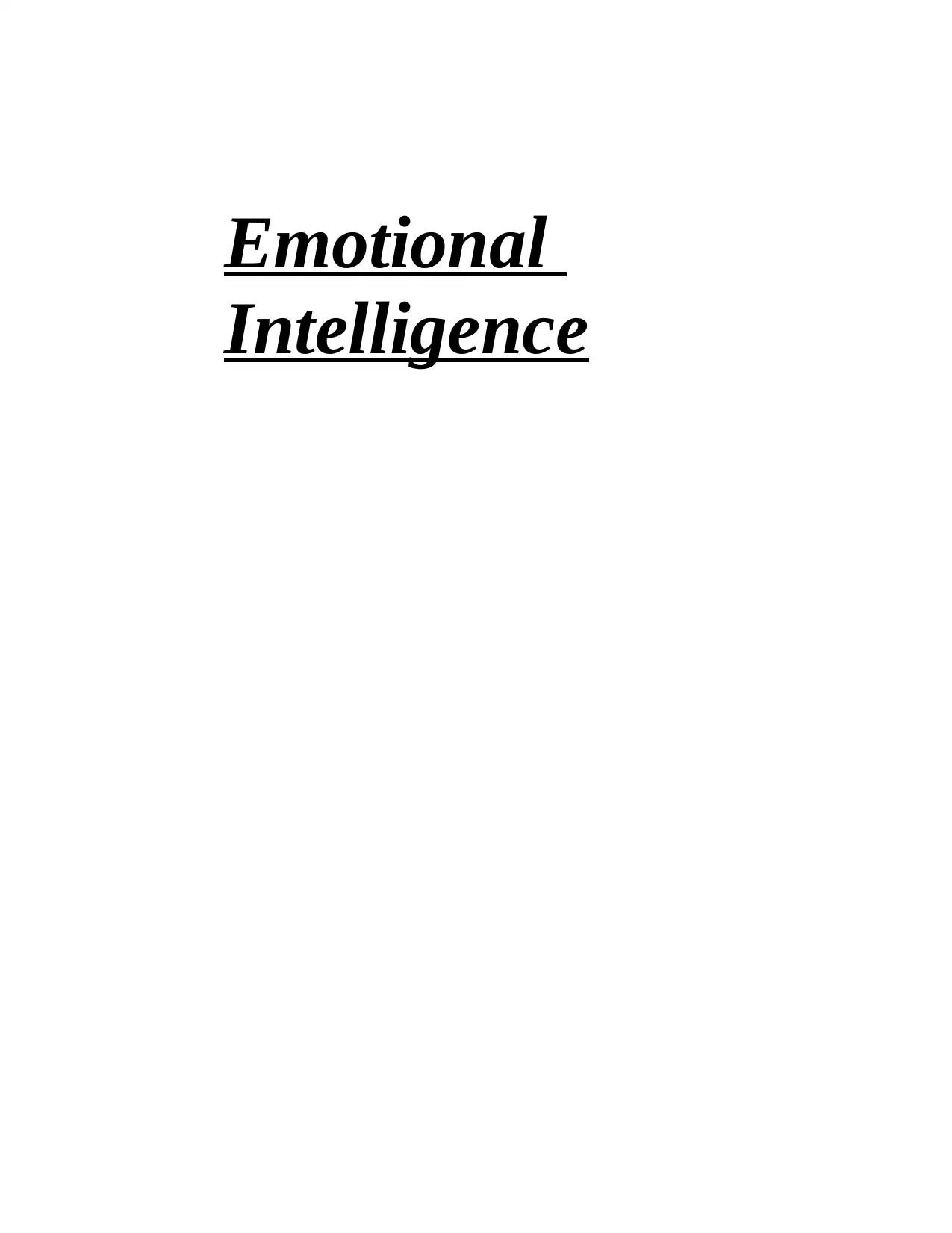
Emotional
Intelligence
Intelligence
Secure Best Marks with AI Grader
Need help grading? Try our AI Grader for instant feedback on your assignments.
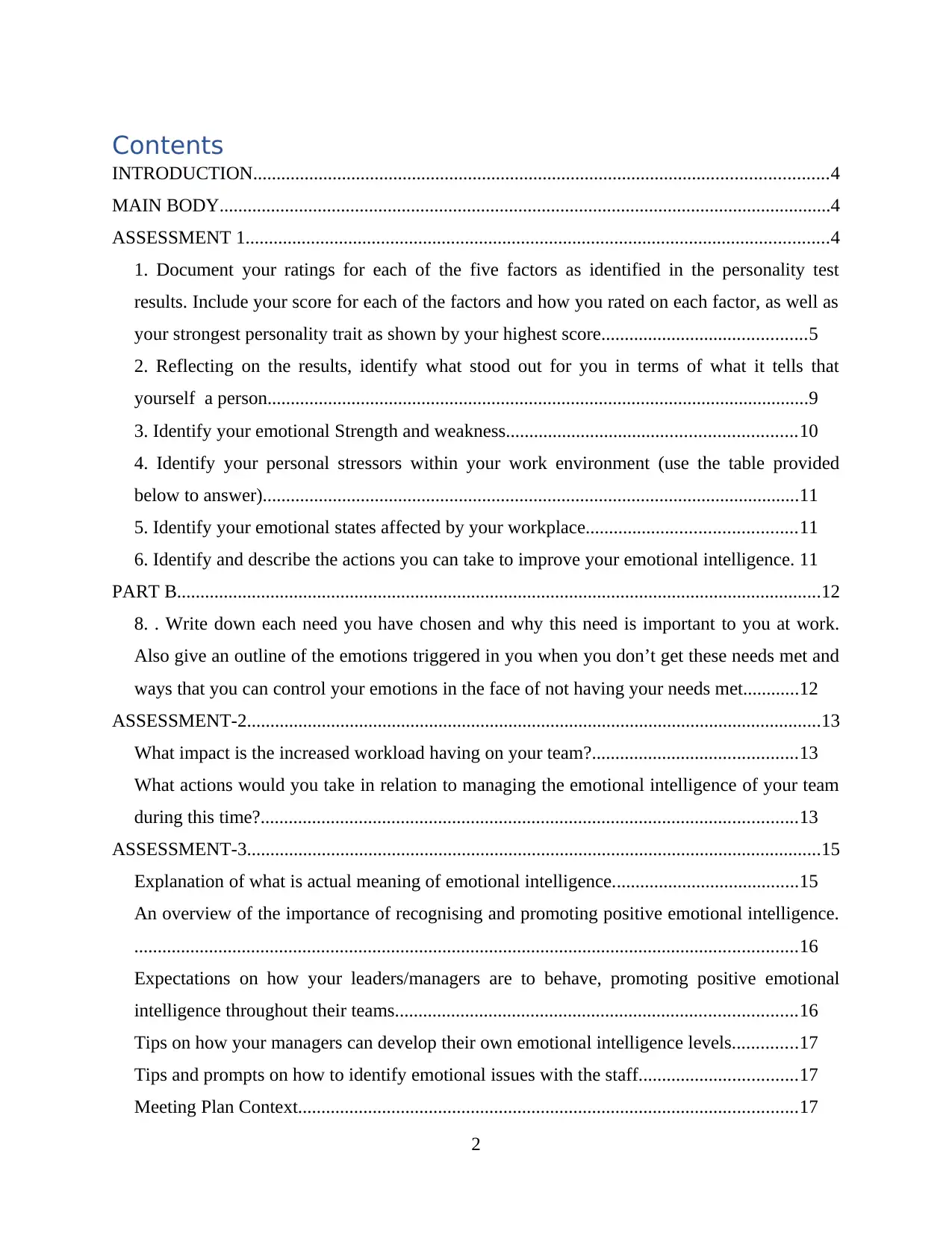
Contents
INTRODUCTION...........................................................................................................................4
MAIN BODY...................................................................................................................................4
ASSESSMENT 1.............................................................................................................................4
1. Document your ratings for each of the five factors as identified in the personality test
results. Include your score for each of the factors and how you rated on each factor, as well as
your strongest personality trait as shown by your highest score............................................5
2. Reflecting on the results, identify what stood out for you in terms of what it tells that
yourself a person....................................................................................................................9
3. Identify your emotional Strength and weakness..............................................................10
4. Identify your personal stressors within your work environment (use the table provided
below to answer)...................................................................................................................11
5. Identify your emotional states affected by your workplace.............................................11
6. Identify and describe the actions you can take to improve your emotional intelligence. 11
PART B..........................................................................................................................................12
8. . Write down each need you have chosen and why this need is important to you at work.
Also give an outline of the emotions triggered in you when you don’t get these needs met and
ways that you can control your emotions in the face of not having your needs met............12
ASSESSMENT-2...........................................................................................................................13
What impact is the increased workload having on your team?............................................13
What actions would you take in relation to managing the emotional intelligence of your team
during this time?...................................................................................................................13
ASSESSMENT-3...........................................................................................................................15
Explanation of what is actual meaning of emotional intelligence........................................15
An overview of the importance of recognising and promoting positive emotional intelligence.
..............................................................................................................................................16
Expectations on how your leaders/managers are to behave, promoting positive emotional
intelligence throughout their teams......................................................................................16
Tips on how your managers can develop their own emotional intelligence levels..............17
Tips and prompts on how to identify emotional issues with the staff..................................17
Meeting Plan Context...........................................................................................................17
2
INTRODUCTION...........................................................................................................................4
MAIN BODY...................................................................................................................................4
ASSESSMENT 1.............................................................................................................................4
1. Document your ratings for each of the five factors as identified in the personality test
results. Include your score for each of the factors and how you rated on each factor, as well as
your strongest personality trait as shown by your highest score............................................5
2. Reflecting on the results, identify what stood out for you in terms of what it tells that
yourself a person....................................................................................................................9
3. Identify your emotional Strength and weakness..............................................................10
4. Identify your personal stressors within your work environment (use the table provided
below to answer)...................................................................................................................11
5. Identify your emotional states affected by your workplace.............................................11
6. Identify and describe the actions you can take to improve your emotional intelligence. 11
PART B..........................................................................................................................................12
8. . Write down each need you have chosen and why this need is important to you at work.
Also give an outline of the emotions triggered in you when you don’t get these needs met and
ways that you can control your emotions in the face of not having your needs met............12
ASSESSMENT-2...........................................................................................................................13
What impact is the increased workload having on your team?............................................13
What actions would you take in relation to managing the emotional intelligence of your team
during this time?...................................................................................................................13
ASSESSMENT-3...........................................................................................................................15
Explanation of what is actual meaning of emotional intelligence........................................15
An overview of the importance of recognising and promoting positive emotional intelligence.
..............................................................................................................................................16
Expectations on how your leaders/managers are to behave, promoting positive emotional
intelligence throughout their teams......................................................................................16
Tips on how your managers can develop their own emotional intelligence levels..............17
Tips and prompts on how to identify emotional issues with the staff..................................17
Meeting Plan Context...........................................................................................................17
2
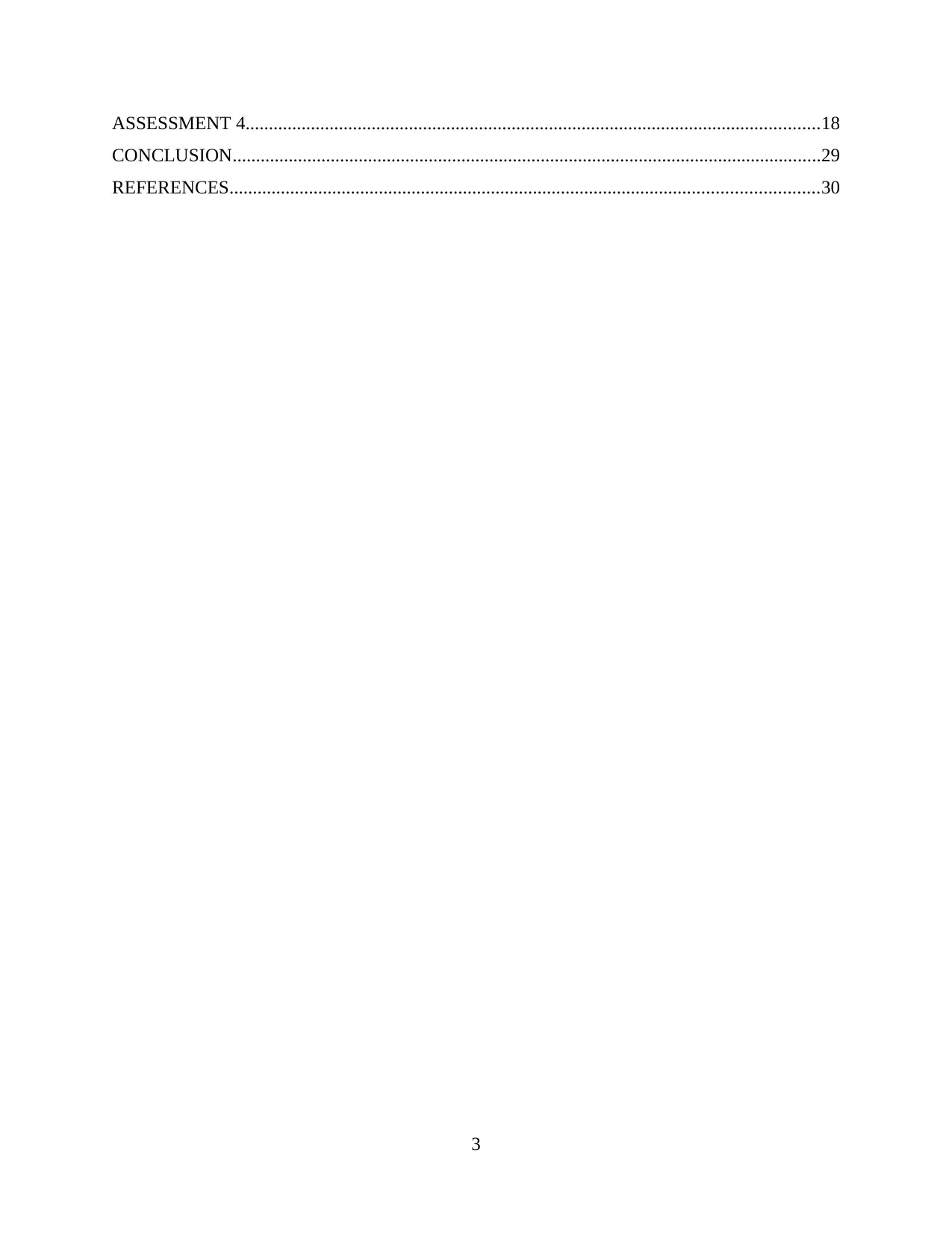
ASSESSMENT 4...........................................................................................................................18
CONCLUSION..............................................................................................................................29
REFERENCES..............................................................................................................................30
3
CONCLUSION..............................................................................................................................29
REFERENCES..............................................................................................................................30
3
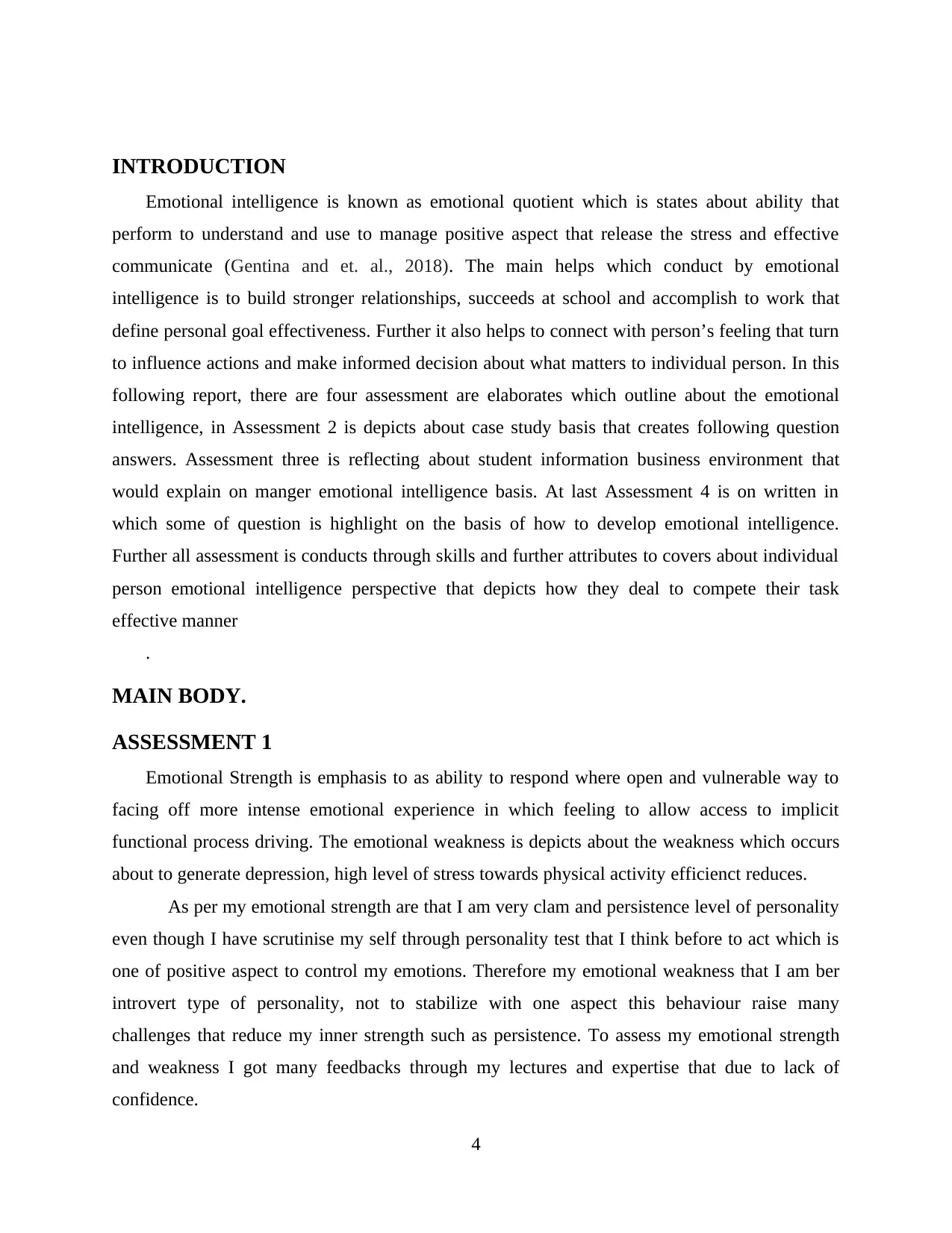
INTRODUCTION
Emotional intelligence is known as emotional quotient which is states about ability that
perform to understand and use to manage positive aspect that release the stress and effective
communicate (Gentina and et. al., 2018). The main helps which conduct by emotional
intelligence is to build stronger relationships, succeeds at school and accomplish to work that
define personal goal effectiveness. Further it also helps to connect with person’s feeling that turn
to influence actions and make informed decision about what matters to individual person. In this
following report, there are four assessment are elaborates which outline about the emotional
intelligence, in Assessment 2 is depicts about case study basis that creates following question
answers. Assessment three is reflecting about student information business environment that
would explain on manger emotional intelligence basis. At last Assessment 4 is on written in
which some of question is highlight on the basis of how to develop emotional intelligence.
Further all assessment is conducts through skills and further attributes to covers about individual
person emotional intelligence perspective that depicts how they deal to compete their task
effective manner
.
MAIN BODY.
ASSESSMENT 1
Emotional Strength is emphasis to as ability to respond where open and vulnerable way to
facing off more intense emotional experience in which feeling to allow access to implicit
functional process driving. The emotional weakness is depicts about the weakness which occurs
about to generate depression, high level of stress towards physical activity efficienct reduces.
As per my emotional strength are that I am very clam and persistence level of personality
even though I have scrutinise my self through personality test that I think before to act which is
one of positive aspect to control my emotions. Therefore my emotional weakness that I am ber
introvert type of personality, not to stabilize with one aspect this behaviour raise many
challenges that reduce my inner strength such as persistence. To assess my emotional strength
and weakness I got many feedbacks through my lectures and expertise that due to lack of
confidence.
4
Emotional intelligence is known as emotional quotient which is states about ability that
perform to understand and use to manage positive aspect that release the stress and effective
communicate (Gentina and et. al., 2018). The main helps which conduct by emotional
intelligence is to build stronger relationships, succeeds at school and accomplish to work that
define personal goal effectiveness. Further it also helps to connect with person’s feeling that turn
to influence actions and make informed decision about what matters to individual person. In this
following report, there are four assessment are elaborates which outline about the emotional
intelligence, in Assessment 2 is depicts about case study basis that creates following question
answers. Assessment three is reflecting about student information business environment that
would explain on manger emotional intelligence basis. At last Assessment 4 is on written in
which some of question is highlight on the basis of how to develop emotional intelligence.
Further all assessment is conducts through skills and further attributes to covers about individual
person emotional intelligence perspective that depicts how they deal to compete their task
effective manner
.
MAIN BODY.
ASSESSMENT 1
Emotional Strength is emphasis to as ability to respond where open and vulnerable way to
facing off more intense emotional experience in which feeling to allow access to implicit
functional process driving. The emotional weakness is depicts about the weakness which occurs
about to generate depression, high level of stress towards physical activity efficienct reduces.
As per my emotional strength are that I am very clam and persistence level of personality
even though I have scrutinise my self through personality test that I think before to act which is
one of positive aspect to control my emotions. Therefore my emotional weakness that I am ber
introvert type of personality, not to stabilize with one aspect this behaviour raise many
challenges that reduce my inner strength such as persistence. To assess my emotional strength
and weakness I got many feedbacks through my lectures and expertise that due to lack of
confidence.
4
Secure Best Marks with AI Grader
Need help grading? Try our AI Grader for instant feedback on your assignments.
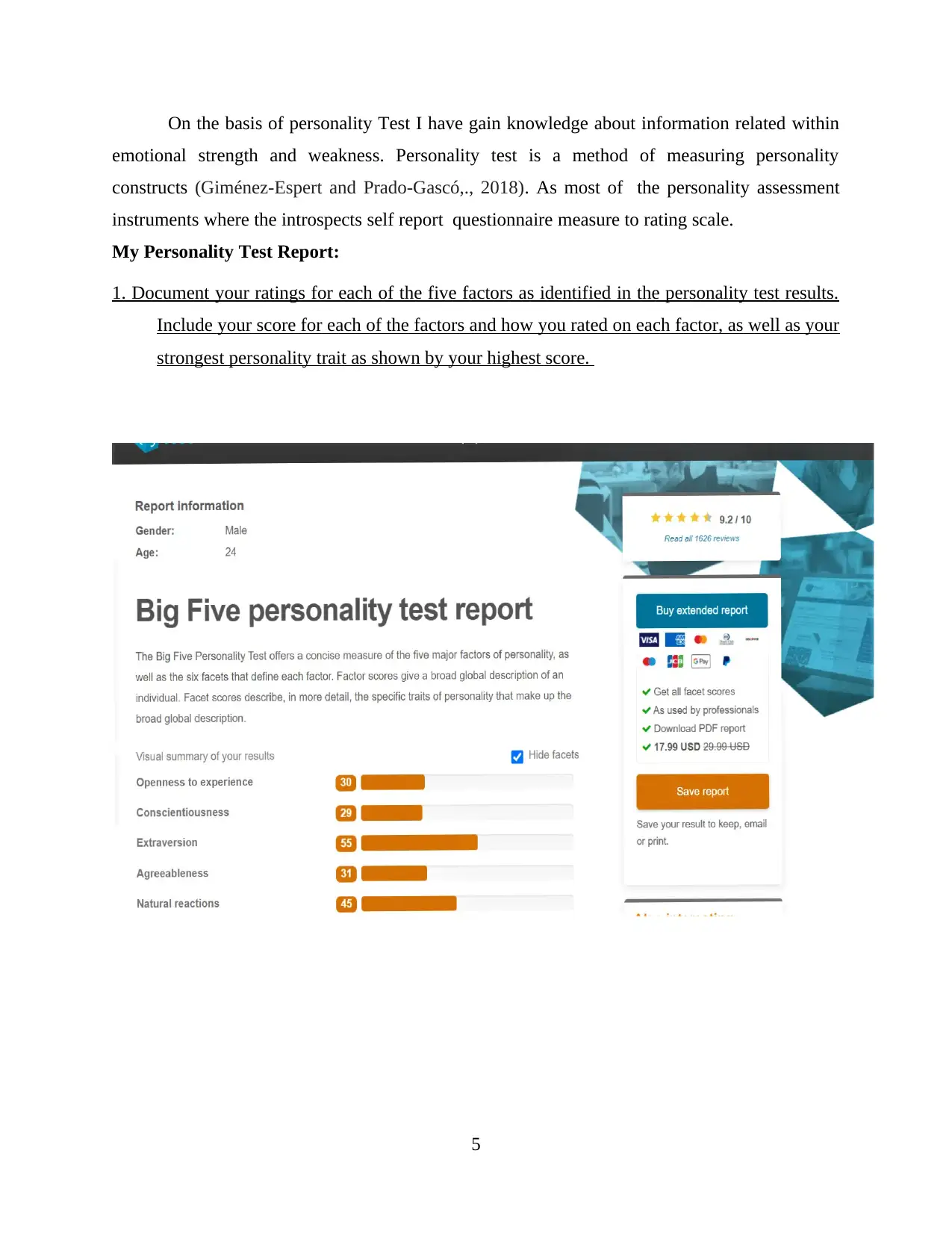
On the basis of personality Test I have gain knowledge about information related within
emotional strength and weakness. Personality test is a method of measuring personality
constructs (Giménez‐Espert and Prado‐Gascó,., 2018). As most of the personality assessment
instruments where the introspects self report questionnaire measure to rating scale.
My Personality Test Report:
1. Document your ratings for each of the five factors as identified in the personality test results.
Include your score for each of the factors and how you rated on each factor, as well as your
strongest personality trait as shown by your highest score.
5
emotional strength and weakness. Personality test is a method of measuring personality
constructs (Giménez‐Espert and Prado‐Gascó,., 2018). As most of the personality assessment
instruments where the introspects self report questionnaire measure to rating scale.
My Personality Test Report:
1. Document your ratings for each of the five factors as identified in the personality test results.
Include your score for each of the factors and how you rated on each factor, as well as your
strongest personality trait as shown by your highest score.
5
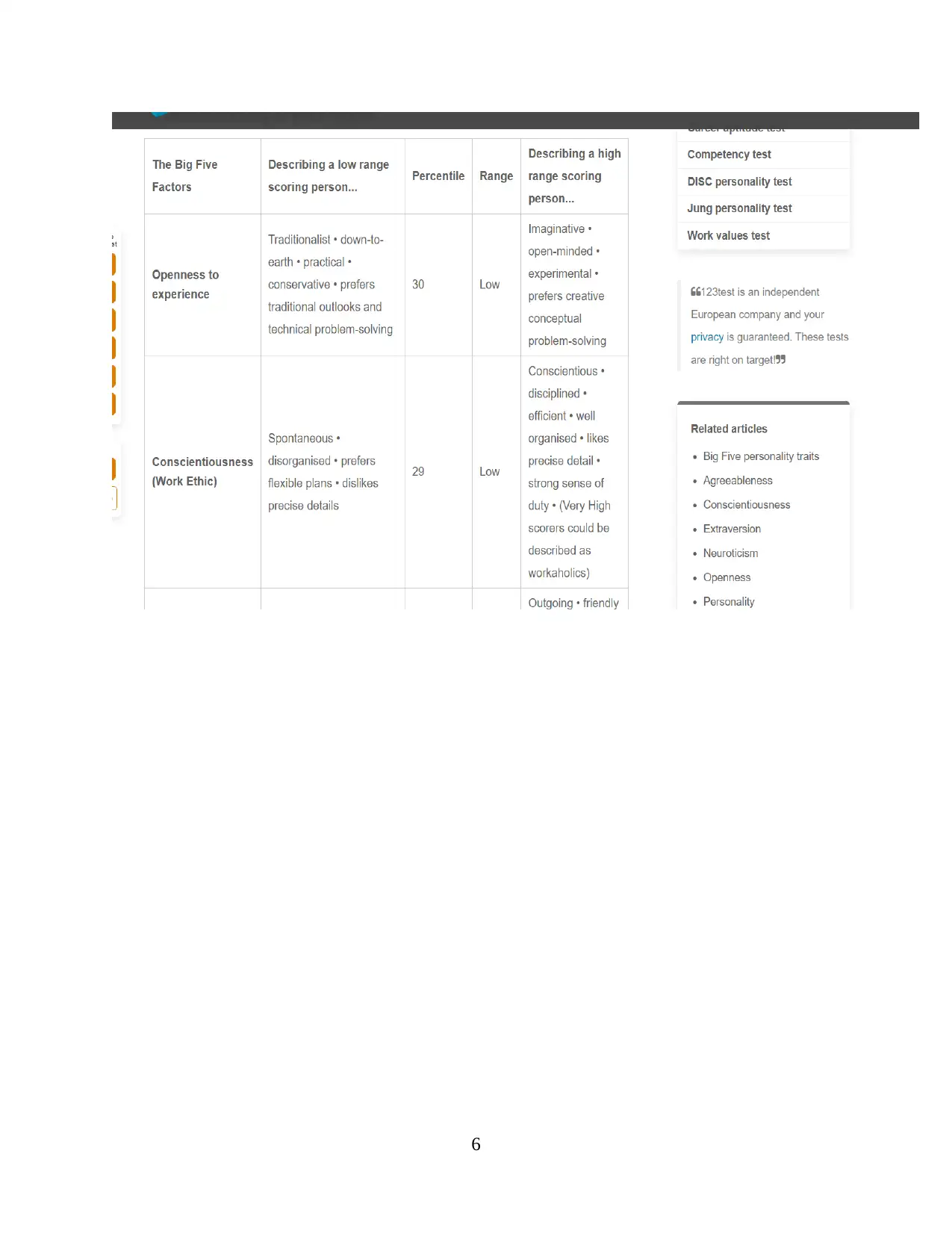
6
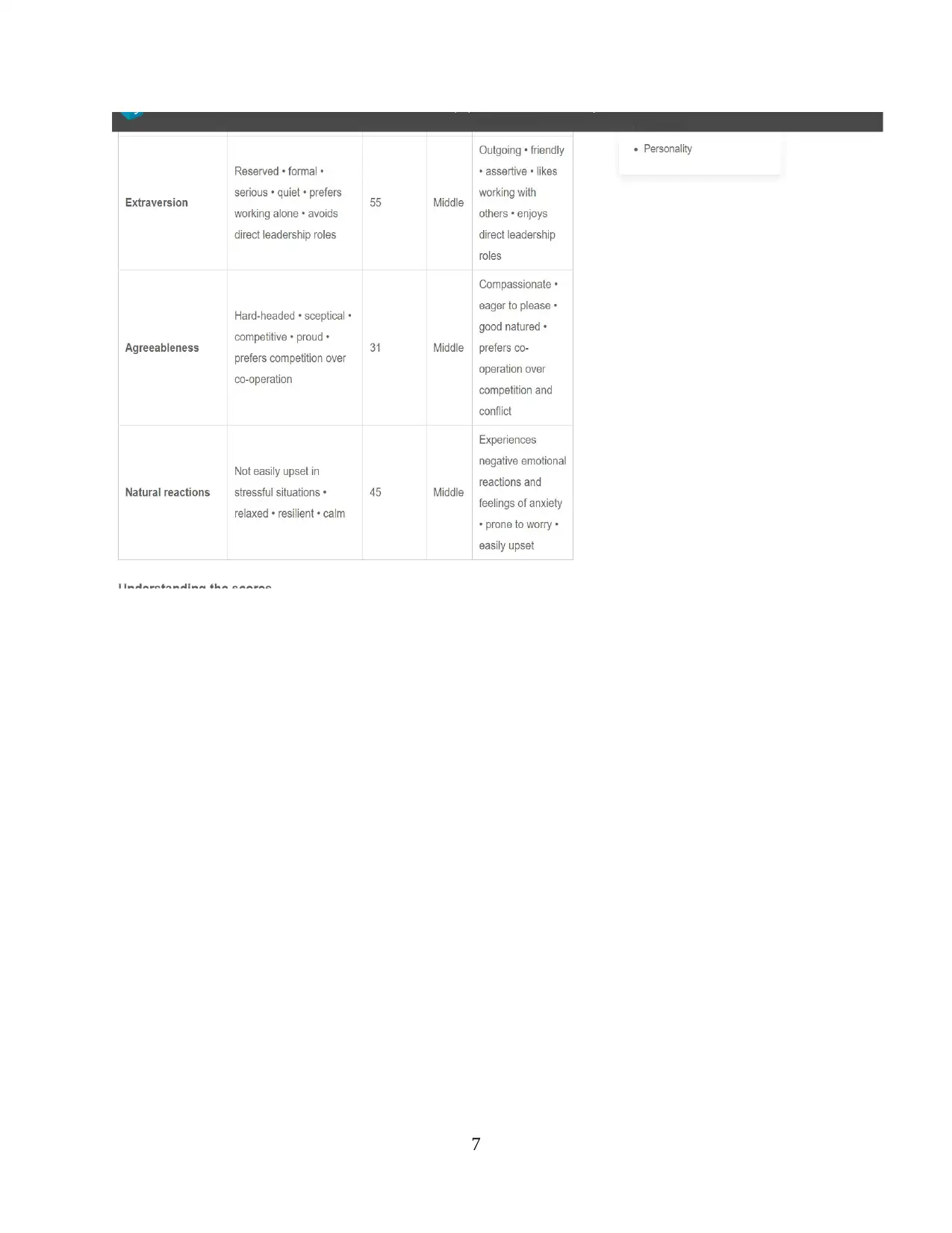
7
Paraphrase This Document
Need a fresh take? Get an instant paraphrase of this document with our AI Paraphraser
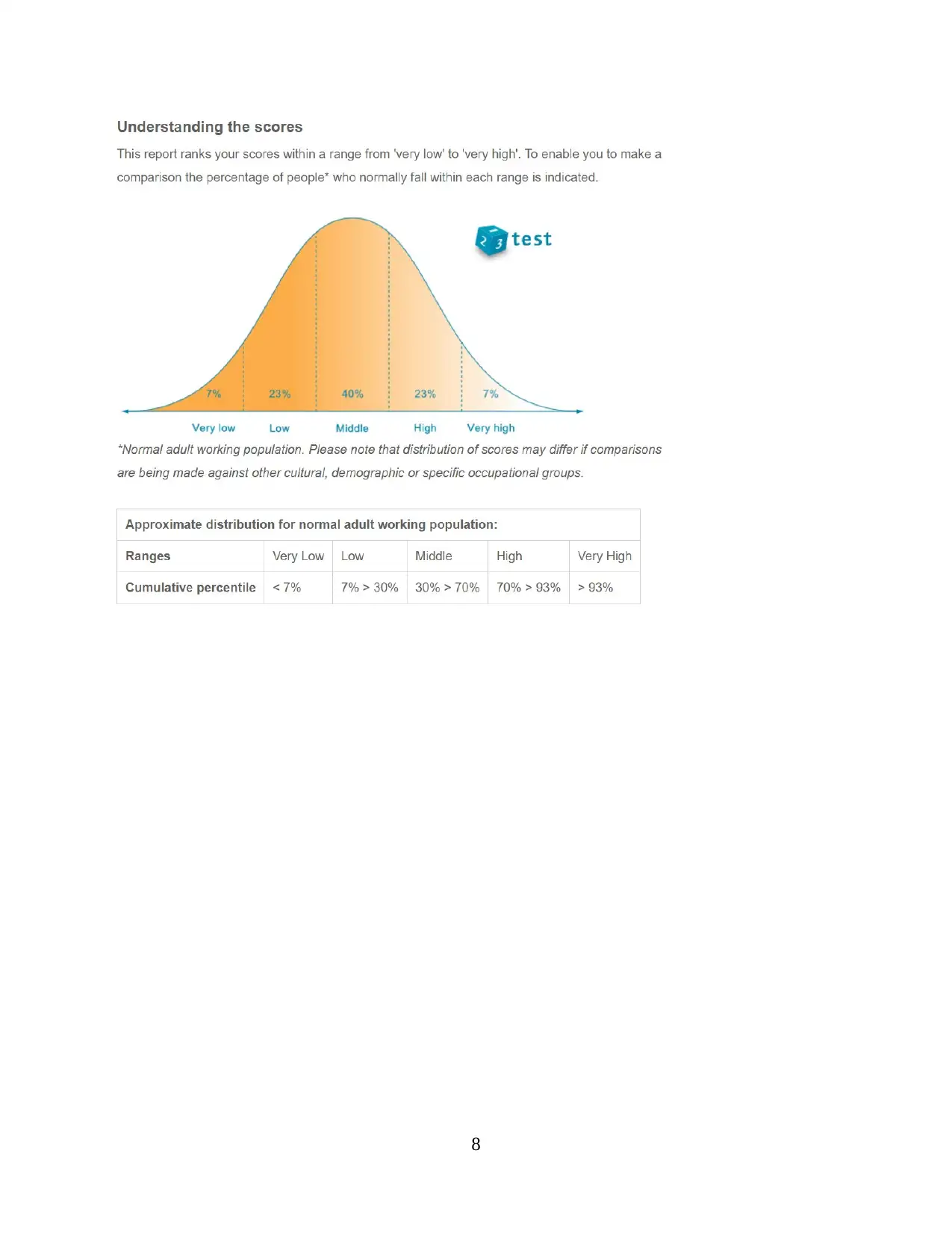
8
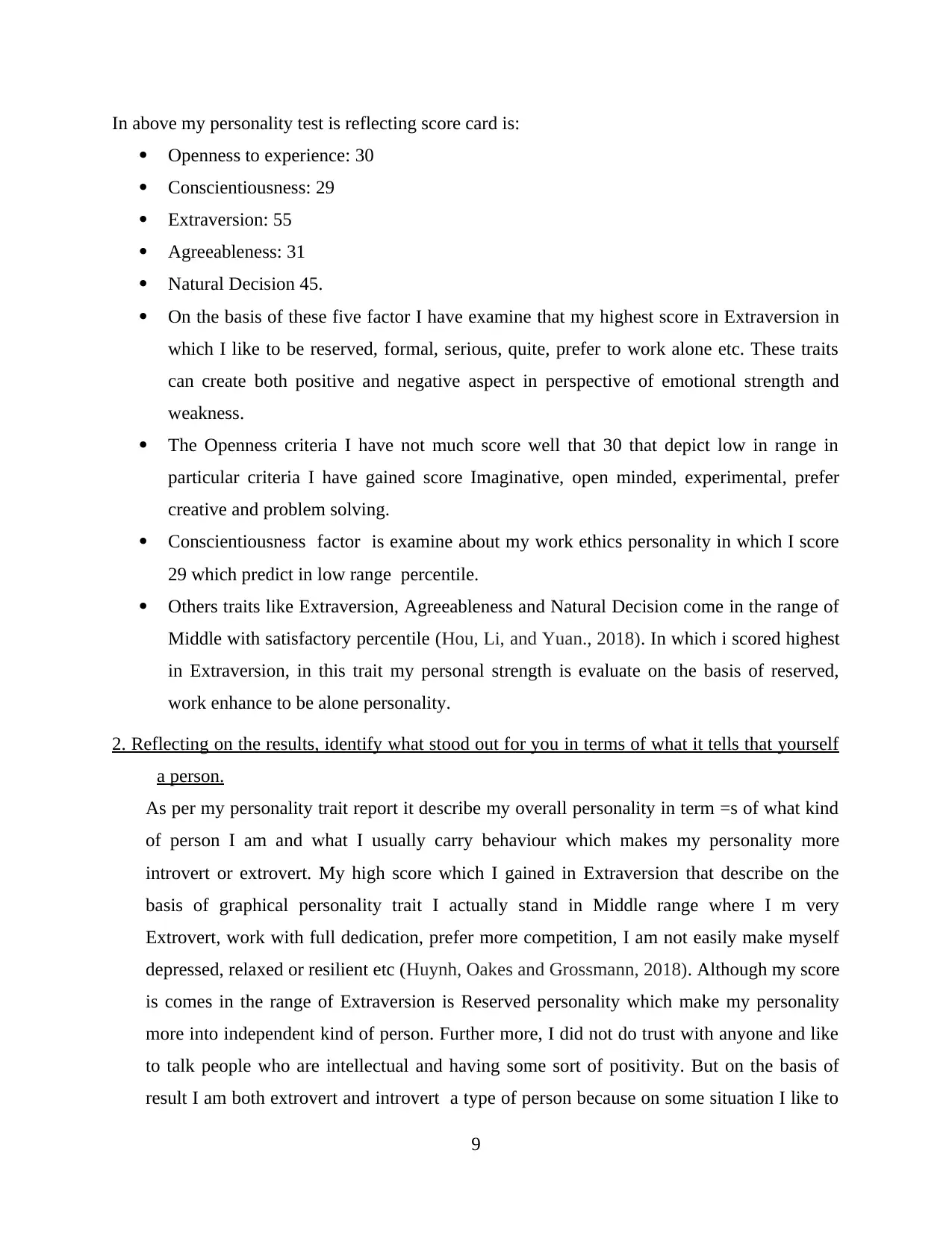
In above my personality test is reflecting score card is:
Openness to experience: 30
Conscientiousness: 29
Extraversion: 55
Agreeableness: 31
Natural Decision 45.
On the basis of these five factor I have examine that my highest score in Extraversion in
which I like to be reserved, formal, serious, quite, prefer to work alone etc. These traits
can create both positive and negative aspect in perspective of emotional strength and
weakness.
The Openness criteria I have not much score well that 30 that depict low in range in
particular criteria I have gained score Imaginative, open minded, experimental, prefer
creative and problem solving.
Conscientiousness factor is examine about my work ethics personality in which I score
29 which predict in low range percentile.
Others traits like Extraversion, Agreeableness and Natural Decision come in the range of
Middle with satisfactory percentile (Hou, Li, and Yuan., 2018). In which i scored highest
in Extraversion, in this trait my personal strength is evaluate on the basis of reserved,
work enhance to be alone personality.
2. Reflecting on the results, identify what stood out for you in terms of what it tells that yourself
a person.
As per my personality trait report it describe my overall personality in term =s of what kind
of person I am and what I usually carry behaviour which makes my personality more
introvert or extrovert. My high score which I gained in Extraversion that describe on the
basis of graphical personality trait I actually stand in Middle range where I m very
Extrovert, work with full dedication, prefer more competition, I am not easily make myself
depressed, relaxed or resilient etc (Huynh, Oakes and Grossmann, 2018). Although my score
is comes in the range of Extraversion is Reserved personality which make my personality
more into independent kind of person. Further more, I did not do trust with anyone and like
to talk people who are intellectual and having some sort of positivity. But on the basis of
result I am both extrovert and introvert a type of person because on some situation I like to
9
Openness to experience: 30
Conscientiousness: 29
Extraversion: 55
Agreeableness: 31
Natural Decision 45.
On the basis of these five factor I have examine that my highest score in Extraversion in
which I like to be reserved, formal, serious, quite, prefer to work alone etc. These traits
can create both positive and negative aspect in perspective of emotional strength and
weakness.
The Openness criteria I have not much score well that 30 that depict low in range in
particular criteria I have gained score Imaginative, open minded, experimental, prefer
creative and problem solving.
Conscientiousness factor is examine about my work ethics personality in which I score
29 which predict in low range percentile.
Others traits like Extraversion, Agreeableness and Natural Decision come in the range of
Middle with satisfactory percentile (Hou, Li, and Yuan., 2018). In which i scored highest
in Extraversion, in this trait my personal strength is evaluate on the basis of reserved,
work enhance to be alone personality.
2. Reflecting on the results, identify what stood out for you in terms of what it tells that yourself
a person.
As per my personality trait report it describe my overall personality in term =s of what kind
of person I am and what I usually carry behaviour which makes my personality more
introvert or extrovert. My high score which I gained in Extraversion that describe on the
basis of graphical personality trait I actually stand in Middle range where I m very
Extrovert, work with full dedication, prefer more competition, I am not easily make myself
depressed, relaxed or resilient etc (Huynh, Oakes and Grossmann, 2018). Although my score
is comes in the range of Extraversion is Reserved personality which make my personality
more into independent kind of person. Further more, I did not do trust with anyone and like
to talk people who are intellectual and having some sort of positivity. But on the basis of
result I am both extrovert and introvert a type of person because on some situation I like to
9
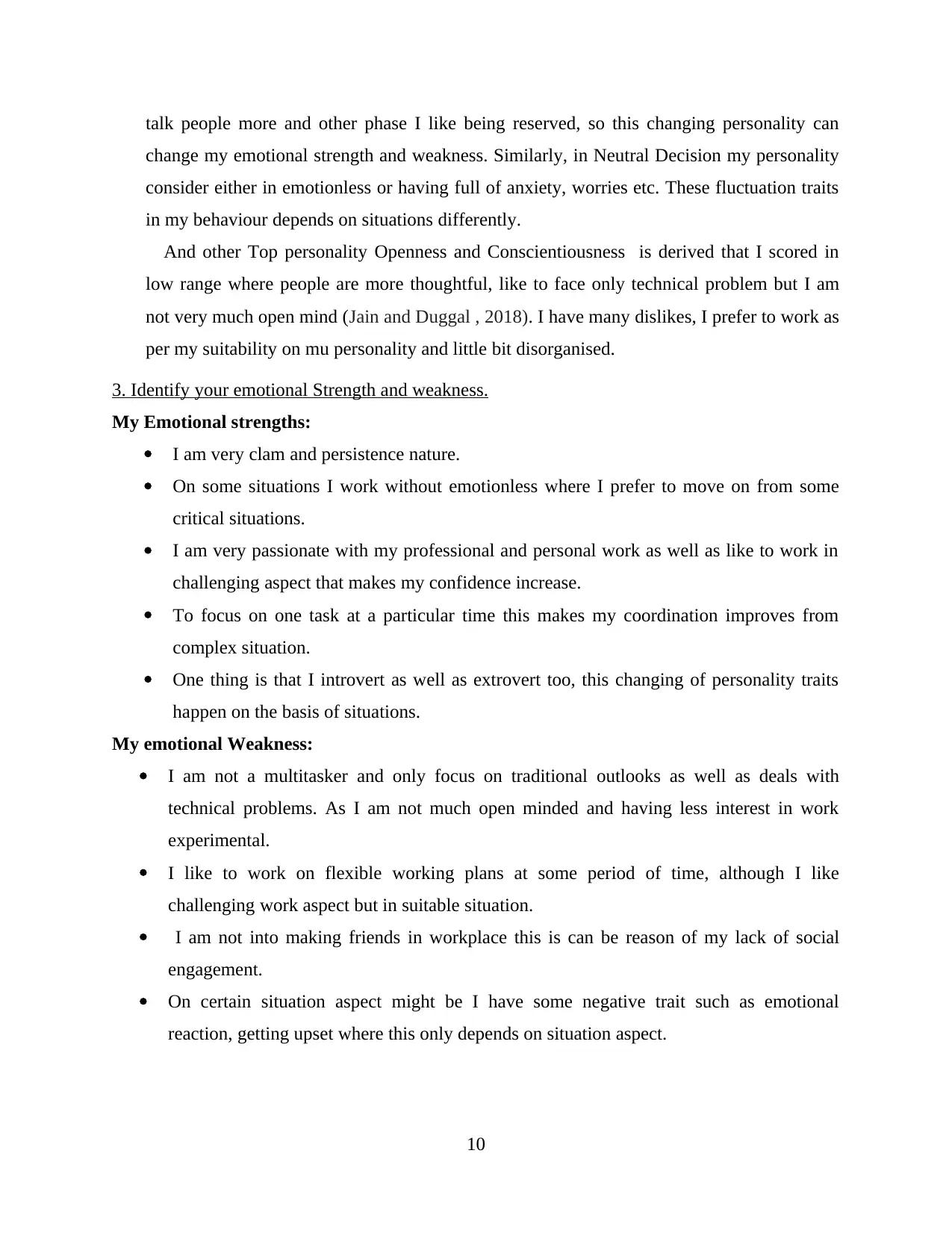
talk people more and other phase I like being reserved, so this changing personality can
change my emotional strength and weakness. Similarly, in Neutral Decision my personality
consider either in emotionless or having full of anxiety, worries etc. These fluctuation traits
in my behaviour depends on situations differently.
And other Top personality Openness and Conscientiousness is derived that I scored in
low range where people are more thoughtful, like to face only technical problem but I am
not very much open mind (Jain and Duggal , 2018). I have many dislikes, I prefer to work as
per my suitability on mu personality and little bit disorganised.
3. Identify your emotional Strength and weakness.
My Emotional strengths:
I am very clam and persistence nature.
On some situations I work without emotionless where I prefer to move on from some
critical situations.
I am very passionate with my professional and personal work as well as like to work in
challenging aspect that makes my confidence increase.
To focus on one task at a particular time this makes my coordination improves from
complex situation.
One thing is that I introvert as well as extrovert too, this changing of personality traits
happen on the basis of situations.
My emotional Weakness:
I am not a multitasker and only focus on traditional outlooks as well as deals with
technical problems. As I am not much open minded and having less interest in work
experimental.
I like to work on flexible working plans at some period of time, although I like
challenging work aspect but in suitable situation.
I am not into making friends in workplace this is can be reason of my lack of social
engagement.
On certain situation aspect might be I have some negative trait such as emotional
reaction, getting upset where this only depends on situation aspect.
10
change my emotional strength and weakness. Similarly, in Neutral Decision my personality
consider either in emotionless or having full of anxiety, worries etc. These fluctuation traits
in my behaviour depends on situations differently.
And other Top personality Openness and Conscientiousness is derived that I scored in
low range where people are more thoughtful, like to face only technical problem but I am
not very much open mind (Jain and Duggal , 2018). I have many dislikes, I prefer to work as
per my suitability on mu personality and little bit disorganised.
3. Identify your emotional Strength and weakness.
My Emotional strengths:
I am very clam and persistence nature.
On some situations I work without emotionless where I prefer to move on from some
critical situations.
I am very passionate with my professional and personal work as well as like to work in
challenging aspect that makes my confidence increase.
To focus on one task at a particular time this makes my coordination improves from
complex situation.
One thing is that I introvert as well as extrovert too, this changing of personality traits
happen on the basis of situations.
My emotional Weakness:
I am not a multitasker and only focus on traditional outlooks as well as deals with
technical problems. As I am not much open minded and having less interest in work
experimental.
I like to work on flexible working plans at some period of time, although I like
challenging work aspect but in suitable situation.
I am not into making friends in workplace this is can be reason of my lack of social
engagement.
On certain situation aspect might be I have some negative trait such as emotional
reaction, getting upset where this only depends on situation aspect.
10
Secure Best Marks with AI Grader
Need help grading? Try our AI Grader for instant feedback on your assignments.
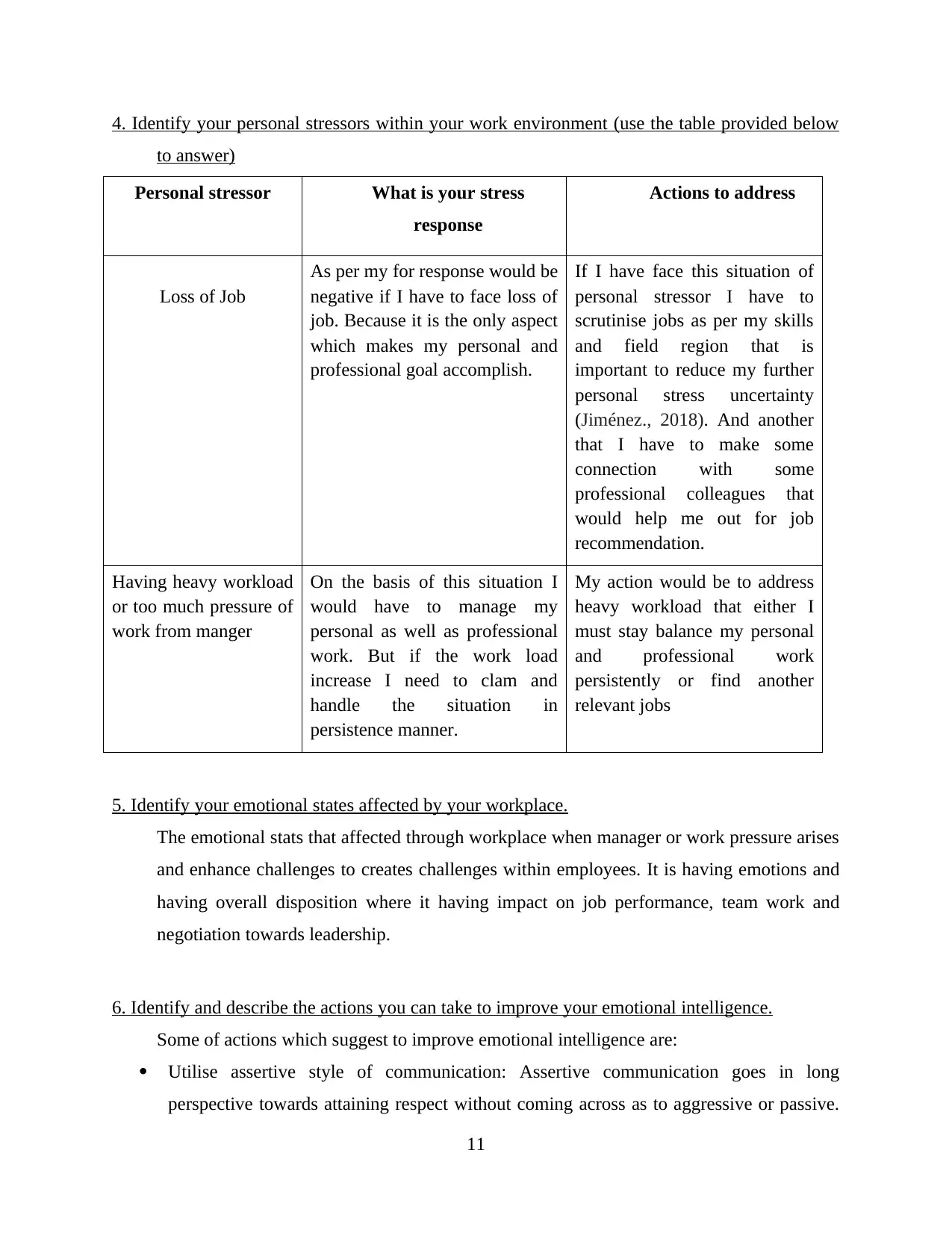
4. Identify your personal stressors within your work environment (use the table provided below
to answer)
Personal stressor What is your stress
response
Actions to address
Loss of Job
As per my for response would be
negative if I have to face loss of
job. Because it is the only aspect
which makes my personal and
professional goal accomplish.
If I have face this situation of
personal stressor I have to
scrutinise jobs as per my skills
and field region that is
important to reduce my further
personal stress uncertainty
(Jiménez., 2018). And another
that I have to make some
connection with some
professional colleagues that
would help me out for job
recommendation.
Having heavy workload
or too much pressure of
work from manger
On the basis of this situation I
would have to manage my
personal as well as professional
work. But if the work load
increase I need to clam and
handle the situation in
persistence manner.
My action would be to address
heavy workload that either I
must stay balance my personal
and professional work
persistently or find another
relevant jobs
5. Identify your emotional states affected by your workplace.
The emotional stats that affected through workplace when manager or work pressure arises
and enhance challenges to creates challenges within employees. It is having emotions and
having overall disposition where it having impact on job performance, team work and
negotiation towards leadership.
6. Identify and describe the actions you can take to improve your emotional intelligence.
Some of actions which suggest to improve emotional intelligence are:
Utilise assertive style of communication: Assertive communication goes in long
perspective towards attaining respect without coming across as to aggressive or passive.
11
to answer)
Personal stressor What is your stress
response
Actions to address
Loss of Job
As per my for response would be
negative if I have to face loss of
job. Because it is the only aspect
which makes my personal and
professional goal accomplish.
If I have face this situation of
personal stressor I have to
scrutinise jobs as per my skills
and field region that is
important to reduce my further
personal stress uncertainty
(Jiménez., 2018). And another
that I have to make some
connection with some
professional colleagues that
would help me out for job
recommendation.
Having heavy workload
or too much pressure of
work from manger
On the basis of this situation I
would have to manage my
personal as well as professional
work. But if the work load
increase I need to clam and
handle the situation in
persistence manner.
My action would be to address
heavy workload that either I
must stay balance my personal
and professional work
persistently or find another
relevant jobs
5. Identify your emotional states affected by your workplace.
The emotional stats that affected through workplace when manager or work pressure arises
and enhance challenges to creates challenges within employees. It is having emotions and
having overall disposition where it having impact on job performance, team work and
negotiation towards leadership.
6. Identify and describe the actions you can take to improve your emotional intelligence.
Some of actions which suggest to improve emotional intelligence are:
Utilise assertive style of communication: Assertive communication goes in long
perspective towards attaining respect without coming across as to aggressive or passive.
11
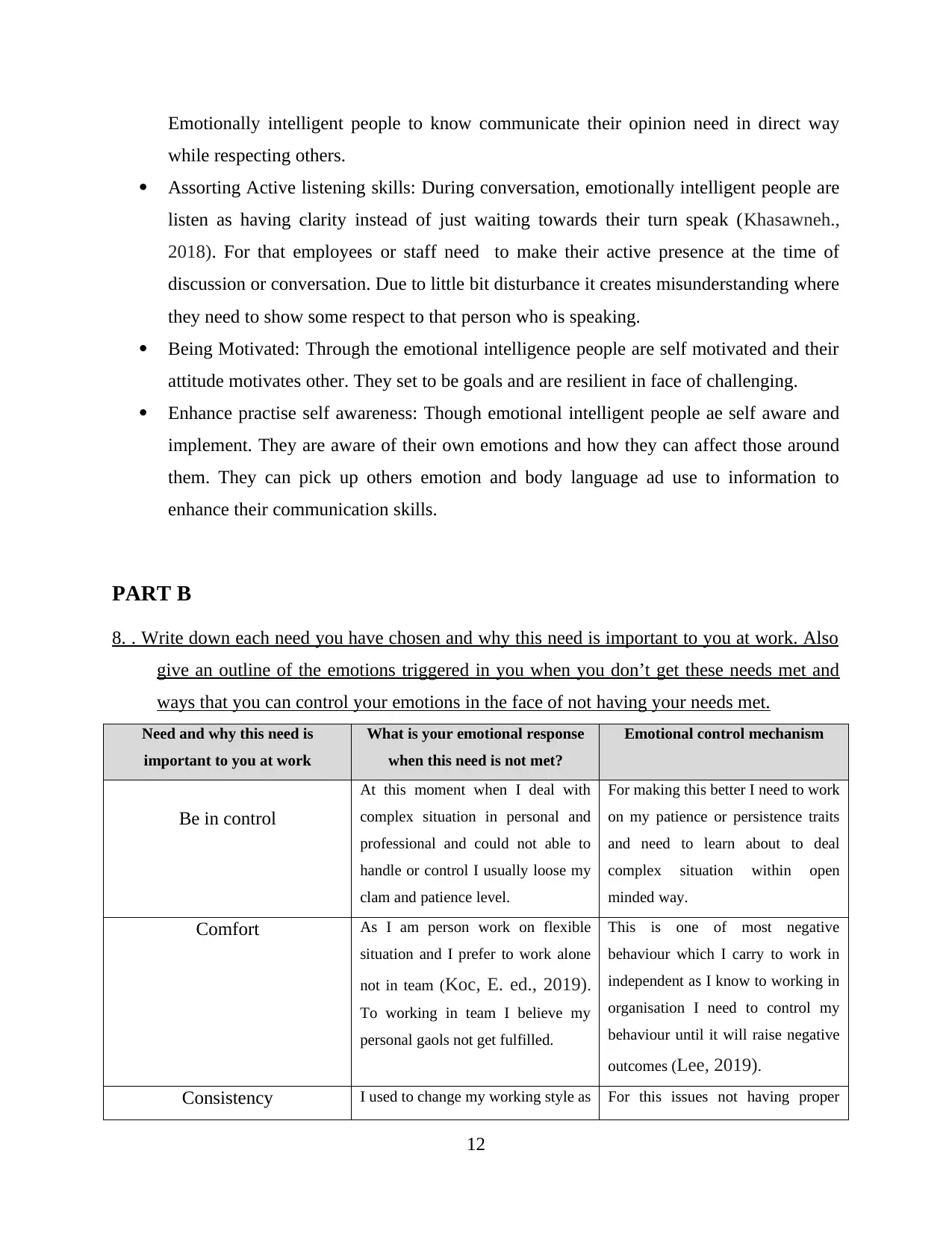
Emotionally intelligent people to know communicate their opinion need in direct way
while respecting others.
Assorting Active listening skills: During conversation, emotionally intelligent people are
listen as having clarity instead of just waiting towards their turn speak (Khasawneh.,
2018). For that employees or staff need to make their active presence at the time of
discussion or conversation. Due to little bit disturbance it creates misunderstanding where
they need to show some respect to that person who is speaking.
Being Motivated: Through the emotional intelligence people are self motivated and their
attitude motivates other. They set to be goals and are resilient in face of challenging.
Enhance practise self awareness: Though emotional intelligent people ae self aware and
implement. They are aware of their own emotions and how they can affect those around
them. They can pick up others emotion and body language ad use to information to
enhance their communication skills.
PART B
8. . Write down each need you have chosen and why this need is important to you at work. Also
give an outline of the emotions triggered in you when you don’t get these needs met and
ways that you can control your emotions in the face of not having your needs met.
Need and why this need is
important to you at work
What is your emotional response
when this need is not met?
Emotional control mechanism
Be in control
At this moment when I deal with
complex situation in personal and
professional and could not able to
handle or control I usually loose my
clam and patience level.
For making this better I need to work
on my patience or persistence traits
and need to learn about to deal
complex situation within open
minded way.
Comfort As I am person work on flexible
situation and I prefer to work alone
not in team (Koc, E. ed., 2019).
To working in team I believe my
personal gaols not get fulfilled.
This is one of most negative
behaviour which I carry to work in
independent as I know to working in
organisation I need to control my
behaviour until it will raise negative
outcomes (Lee, 2019).
Consistency I used to change my working style as For this issues not having proper
12
while respecting others.
Assorting Active listening skills: During conversation, emotionally intelligent people are
listen as having clarity instead of just waiting towards their turn speak (Khasawneh.,
2018). For that employees or staff need to make their active presence at the time of
discussion or conversation. Due to little bit disturbance it creates misunderstanding where
they need to show some respect to that person who is speaking.
Being Motivated: Through the emotional intelligence people are self motivated and their
attitude motivates other. They set to be goals and are resilient in face of challenging.
Enhance practise self awareness: Though emotional intelligent people ae self aware and
implement. They are aware of their own emotions and how they can affect those around
them. They can pick up others emotion and body language ad use to information to
enhance their communication skills.
PART B
8. . Write down each need you have chosen and why this need is important to you at work. Also
give an outline of the emotions triggered in you when you don’t get these needs met and
ways that you can control your emotions in the face of not having your needs met.
Need and why this need is
important to you at work
What is your emotional response
when this need is not met?
Emotional control mechanism
Be in control
At this moment when I deal with
complex situation in personal and
professional and could not able to
handle or control I usually loose my
clam and patience level.
For making this better I need to work
on my patience or persistence traits
and need to learn about to deal
complex situation within open
minded way.
Comfort As I am person work on flexible
situation and I prefer to work alone
not in team (Koc, E. ed., 2019).
To working in team I believe my
personal gaols not get fulfilled.
This is one of most negative
behaviour which I carry to work in
independent as I know to working in
organisation I need to control my
behaviour until it will raise negative
outcomes (Lee, 2019).
Consistency I used to change my working style as For this issues not having proper
12
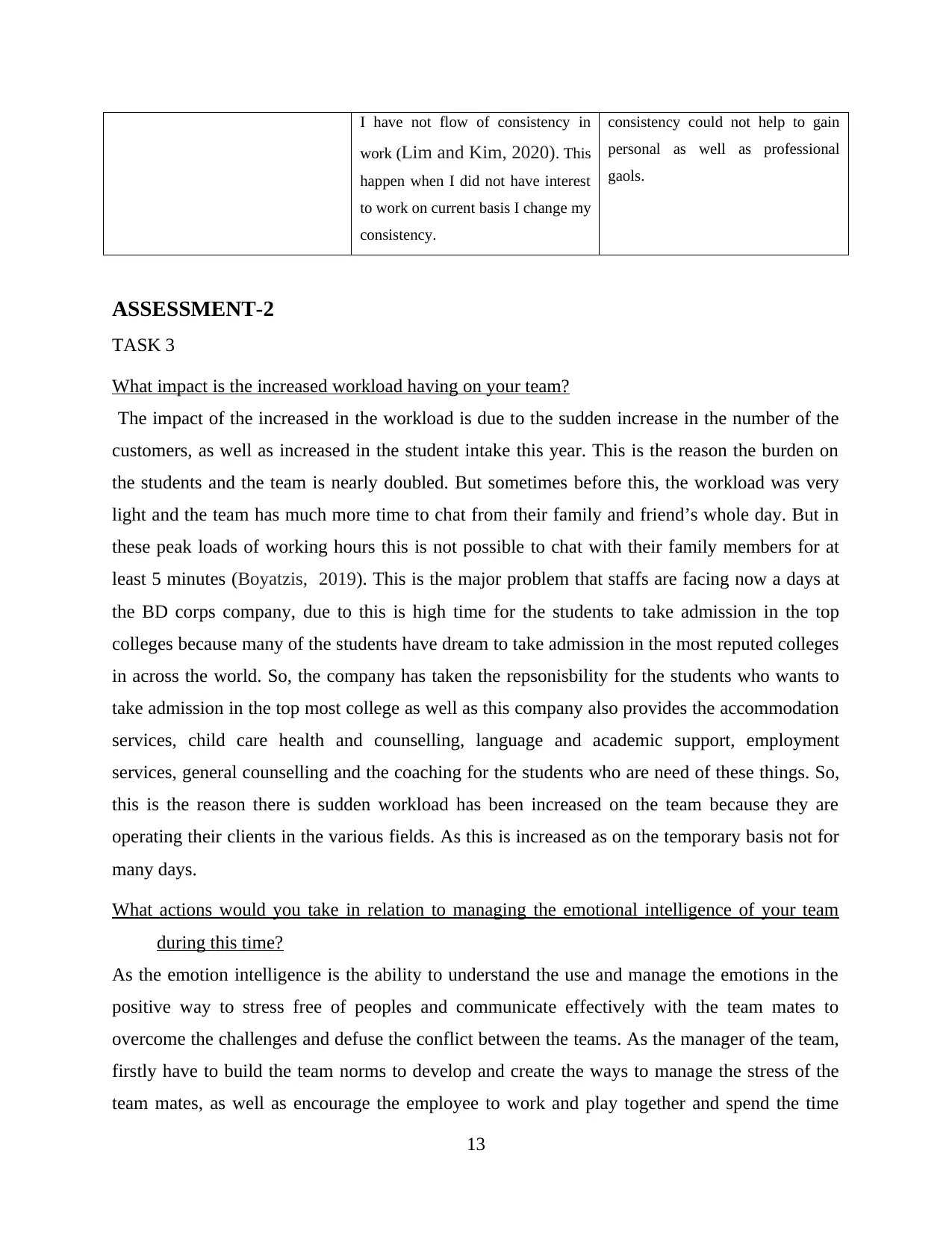
I have not flow of consistency in
work (Lim and Kim, 2020). This
happen when I did not have interest
to work on current basis I change my
consistency.
consistency could not help to gain
personal as well as professional
gaols.
ASSESSMENT-2
TASK 3
What impact is the increased workload having on your team?
The impact of the increased in the workload is due to the sudden increase in the number of the
customers, as well as increased in the student intake this year. This is the reason the burden on
the students and the team is nearly doubled. But sometimes before this, the workload was very
light and the team has much more time to chat from their family and friend’s whole day. But in
these peak loads of working hours this is not possible to chat with their family members for at
least 5 minutes (Boyatzis, 2019). This is the major problem that staffs are facing now a days at
the BD corps company, due to this is high time for the students to take admission in the top
colleges because many of the students have dream to take admission in the most reputed colleges
in across the world. So, the company has taken the repsonisbility for the students who wants to
take admission in the top most college as well as this company also provides the accommodation
services, child care health and counselling, language and academic support, employment
services, general counselling and the coaching for the students who are need of these things. So,
this is the reason there is sudden workload has been increased on the team because they are
operating their clients in the various fields. As this is increased as on the temporary basis not for
many days.
What actions would you take in relation to managing the emotional intelligence of your team
during this time?
As the emotion intelligence is the ability to understand the use and manage the emotions in the
positive way to stress free of peoples and communicate effectively with the team mates to
overcome the challenges and defuse the conflict between the teams. As the manager of the team,
firstly have to build the team norms to develop and create the ways to manage the stress of the
team mates, as well as encourage the employee to work and play together and spend the time
13
work (Lim and Kim, 2020). This
happen when I did not have interest
to work on current basis I change my
consistency.
consistency could not help to gain
personal as well as professional
gaols.
ASSESSMENT-2
TASK 3
What impact is the increased workload having on your team?
The impact of the increased in the workload is due to the sudden increase in the number of the
customers, as well as increased in the student intake this year. This is the reason the burden on
the students and the team is nearly doubled. But sometimes before this, the workload was very
light and the team has much more time to chat from their family and friend’s whole day. But in
these peak loads of working hours this is not possible to chat with their family members for at
least 5 minutes (Boyatzis, 2019). This is the major problem that staffs are facing now a days at
the BD corps company, due to this is high time for the students to take admission in the top
colleges because many of the students have dream to take admission in the most reputed colleges
in across the world. So, the company has taken the repsonisbility for the students who wants to
take admission in the top most college as well as this company also provides the accommodation
services, child care health and counselling, language and academic support, employment
services, general counselling and the coaching for the students who are need of these things. So,
this is the reason there is sudden workload has been increased on the team because they are
operating their clients in the various fields. As this is increased as on the temporary basis not for
many days.
What actions would you take in relation to managing the emotional intelligence of your team
during this time?
As the emotion intelligence is the ability to understand the use and manage the emotions in the
positive way to stress free of peoples and communicate effectively with the team mates to
overcome the challenges and defuse the conflict between the teams. As the manager of the team,
firstly have to build the team norms to develop and create the ways to manage the stress of the
team mates, as well as encourage the employee to work and play together and spend the time
13
Paraphrase This Document
Need a fresh take? Get an instant paraphrase of this document with our AI Paraphraser
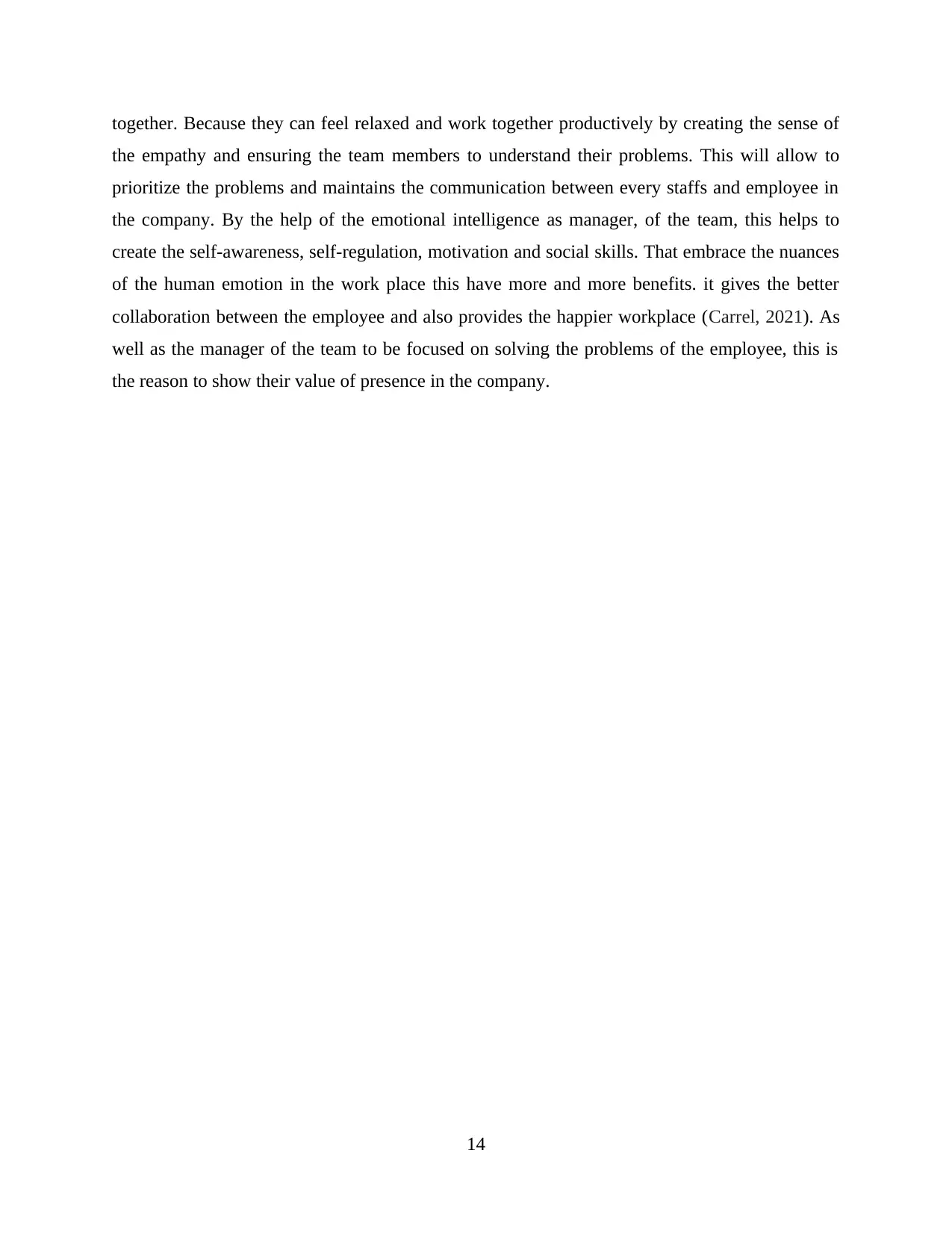
together. Because they can feel relaxed and work together productively by creating the sense of
the empathy and ensuring the team members to understand their problems. This will allow to
prioritize the problems and maintains the communication between every staffs and employee in
the company. By the help of the emotional intelligence as manager, of the team, this helps to
create the self-awareness, self-regulation, motivation and social skills. That embrace the nuances
of the human emotion in the work place this have more and more benefits. it gives the better
collaboration between the employee and also provides the happier workplace (Carrel, 2021). As
well as the manager of the team to be focused on solving the problems of the employee, this is
the reason to show their value of presence in the company.
14
the empathy and ensuring the team members to understand their problems. This will allow to
prioritize the problems and maintains the communication between every staffs and employee in
the company. By the help of the emotional intelligence as manager, of the team, this helps to
create the self-awareness, self-regulation, motivation and social skills. That embrace the nuances
of the human emotion in the work place this have more and more benefits. it gives the better
collaboration between the employee and also provides the happier workplace (Carrel, 2021). As
well as the manager of the team to be focused on solving the problems of the employee, this is
the reason to show their value of presence in the company.
14
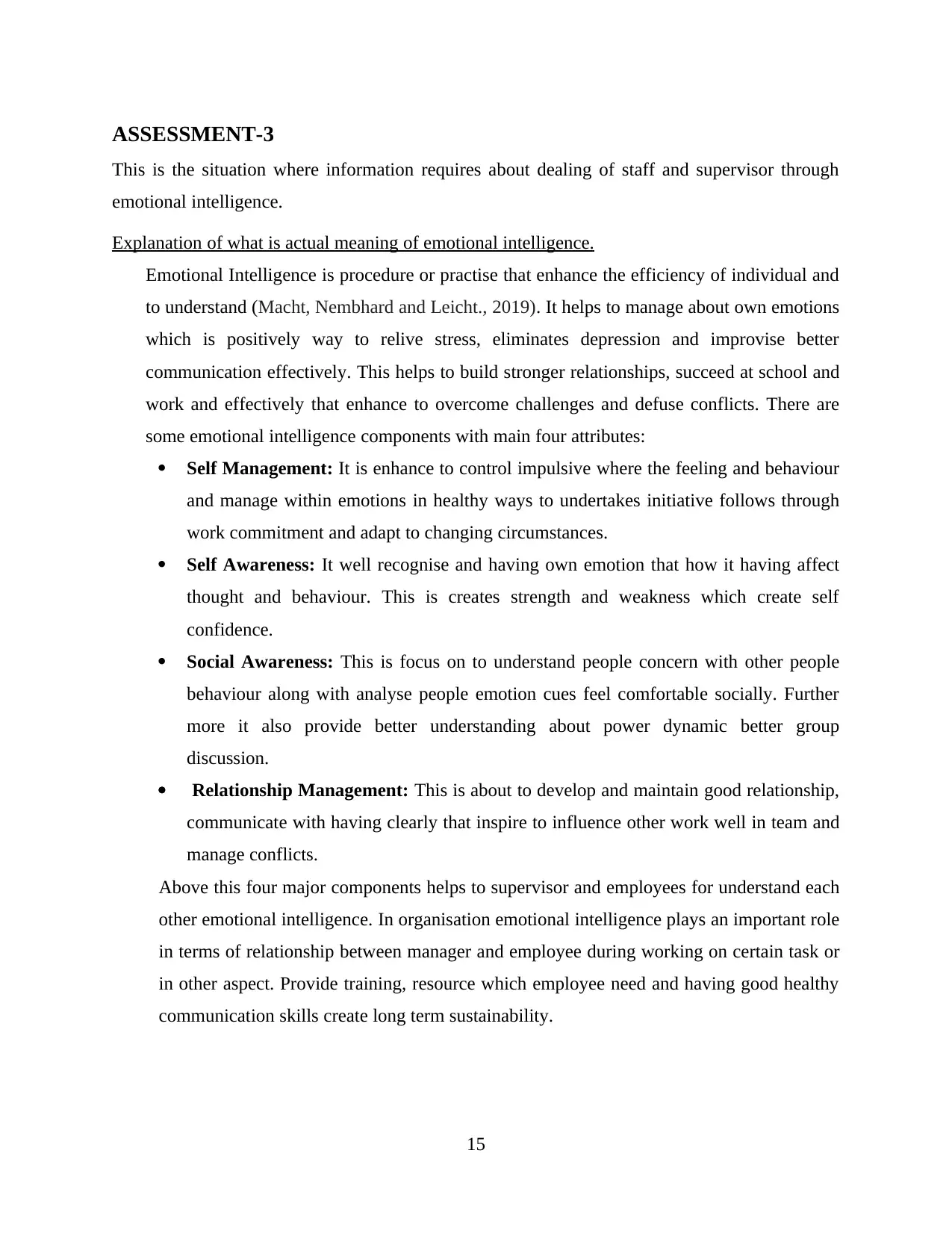
ASSESSMENT-3
This is the situation where information requires about dealing of staff and supervisor through
emotional intelligence.
Explanation of what is actual meaning of emotional intelligence.
Emotional Intelligence is procedure or practise that enhance the efficiency of individual and
to understand (Macht, Nembhard and Leicht., 2019). It helps to manage about own emotions
which is positively way to relive stress, eliminates depression and improvise better
communication effectively. This helps to build stronger relationships, succeed at school and
work and effectively that enhance to overcome challenges and defuse conflicts. There are
some emotional intelligence components with main four attributes:
Self Management: It is enhance to control impulsive where the feeling and behaviour
and manage within emotions in healthy ways to undertakes initiative follows through
work commitment and adapt to changing circumstances.
Self Awareness: It well recognise and having own emotion that how it having affect
thought and behaviour. This is creates strength and weakness which create self
confidence.
Social Awareness: This is focus on to understand people concern with other people
behaviour along with analyse people emotion cues feel comfortable socially. Further
more it also provide better understanding about power dynamic better group
discussion.
Relationship Management: This is about to develop and maintain good relationship,
communicate with having clearly that inspire to influence other work well in team and
manage conflicts.
Above this four major components helps to supervisor and employees for understand each
other emotional intelligence. In organisation emotional intelligence plays an important role
in terms of relationship between manager and employee during working on certain task or
in other aspect. Provide training, resource which employee need and having good healthy
communication skills create long term sustainability.
15
This is the situation where information requires about dealing of staff and supervisor through
emotional intelligence.
Explanation of what is actual meaning of emotional intelligence.
Emotional Intelligence is procedure or practise that enhance the efficiency of individual and
to understand (Macht, Nembhard and Leicht., 2019). It helps to manage about own emotions
which is positively way to relive stress, eliminates depression and improvise better
communication effectively. This helps to build stronger relationships, succeed at school and
work and effectively that enhance to overcome challenges and defuse conflicts. There are
some emotional intelligence components with main four attributes:
Self Management: It is enhance to control impulsive where the feeling and behaviour
and manage within emotions in healthy ways to undertakes initiative follows through
work commitment and adapt to changing circumstances.
Self Awareness: It well recognise and having own emotion that how it having affect
thought and behaviour. This is creates strength and weakness which create self
confidence.
Social Awareness: This is focus on to understand people concern with other people
behaviour along with analyse people emotion cues feel comfortable socially. Further
more it also provide better understanding about power dynamic better group
discussion.
Relationship Management: This is about to develop and maintain good relationship,
communicate with having clearly that inspire to influence other work well in team and
manage conflicts.
Above this four major components helps to supervisor and employees for understand each
other emotional intelligence. In organisation emotional intelligence plays an important role
in terms of relationship between manager and employee during working on certain task or
in other aspect. Provide training, resource which employee need and having good healthy
communication skills create long term sustainability.
15
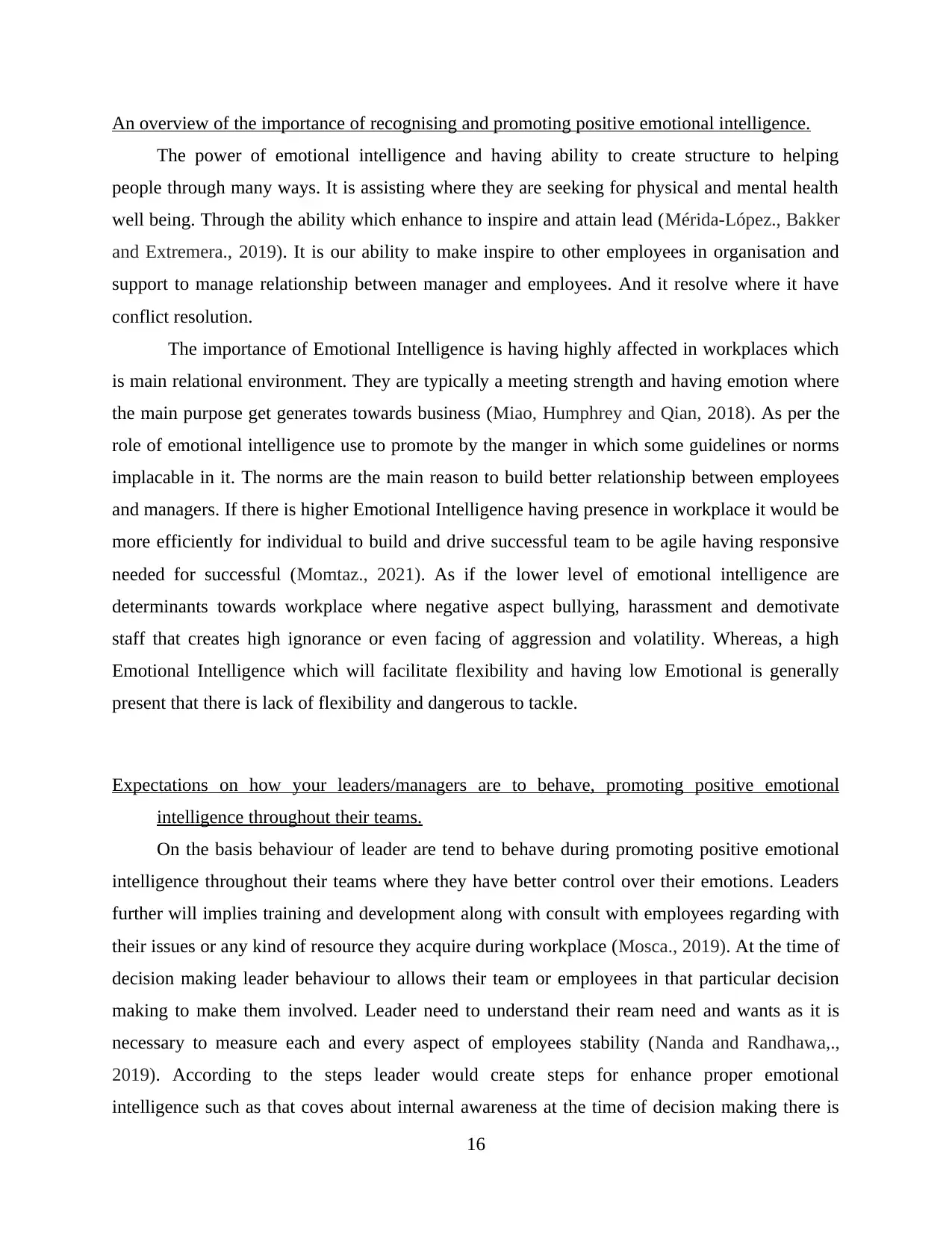
An overview of the importance of recognising and promoting positive emotional intelligence.
The power of emotional intelligence and having ability to create structure to helping
people through many ways. It is assisting where they are seeking for physical and mental health
well being. Through the ability which enhance to inspire and attain lead (Mérida-López., Bakker
and Extremera., 2019). It is our ability to make inspire to other employees in organisation and
support to manage relationship between manager and employees. And it resolve where it have
conflict resolution.
The importance of Emotional Intelligence is having highly affected in workplaces which
is main relational environment. They are typically a meeting strength and having emotion where
the main purpose get generates towards business (Miao, Humphrey and Qian, 2018). As per the
role of emotional intelligence use to promote by the manger in which some guidelines or norms
implacable in it. The norms are the main reason to build better relationship between employees
and managers. If there is higher Emotional Intelligence having presence in workplace it would be
more efficiently for individual to build and drive successful team to be agile having responsive
needed for successful (Momtaz., 2021). As if the lower level of emotional intelligence are
determinants towards workplace where negative aspect bullying, harassment and demotivate
staff that creates high ignorance or even facing of aggression and volatility. Whereas, a high
Emotional Intelligence which will facilitate flexibility and having low Emotional is generally
present that there is lack of flexibility and dangerous to tackle.
Expectations on how your leaders/managers are to behave, promoting positive emotional
intelligence throughout their teams.
On the basis behaviour of leader are tend to behave during promoting positive emotional
intelligence throughout their teams where they have better control over their emotions. Leaders
further will implies training and development along with consult with employees regarding with
their issues or any kind of resource they acquire during workplace (Mosca., 2019). At the time of
decision making leader behaviour to allows their team or employees in that particular decision
making to make them involved. Leader need to understand their ream need and wants as it is
necessary to measure each and every aspect of employees stability (Nanda and Randhawa,.,
2019). According to the steps leader would create steps for enhance proper emotional
intelligence such as that coves about internal awareness at the time of decision making there is
16
The power of emotional intelligence and having ability to create structure to helping
people through many ways. It is assisting where they are seeking for physical and mental health
well being. Through the ability which enhance to inspire and attain lead (Mérida-López., Bakker
and Extremera., 2019). It is our ability to make inspire to other employees in organisation and
support to manage relationship between manager and employees. And it resolve where it have
conflict resolution.
The importance of Emotional Intelligence is having highly affected in workplaces which
is main relational environment. They are typically a meeting strength and having emotion where
the main purpose get generates towards business (Miao, Humphrey and Qian, 2018). As per the
role of emotional intelligence use to promote by the manger in which some guidelines or norms
implacable in it. The norms are the main reason to build better relationship between employees
and managers. If there is higher Emotional Intelligence having presence in workplace it would be
more efficiently for individual to build and drive successful team to be agile having responsive
needed for successful (Momtaz., 2021). As if the lower level of emotional intelligence are
determinants towards workplace where negative aspect bullying, harassment and demotivate
staff that creates high ignorance or even facing of aggression and volatility. Whereas, a high
Emotional Intelligence which will facilitate flexibility and having low Emotional is generally
present that there is lack of flexibility and dangerous to tackle.
Expectations on how your leaders/managers are to behave, promoting positive emotional
intelligence throughout their teams.
On the basis behaviour of leader are tend to behave during promoting positive emotional
intelligence throughout their teams where they have better control over their emotions. Leaders
further will implies training and development along with consult with employees regarding with
their issues or any kind of resource they acquire during workplace (Mosca., 2019). At the time of
decision making leader behaviour to allows their team or employees in that particular decision
making to make them involved. Leader need to understand their ream need and wants as it is
necessary to measure each and every aspect of employees stability (Nanda and Randhawa,.,
2019). According to the steps leader would create steps for enhance proper emotional
intelligence such as that coves about internal awareness at the time of decision making there is
16
Secure Best Marks with AI Grader
Need help grading? Try our AI Grader for instant feedback on your assignments.
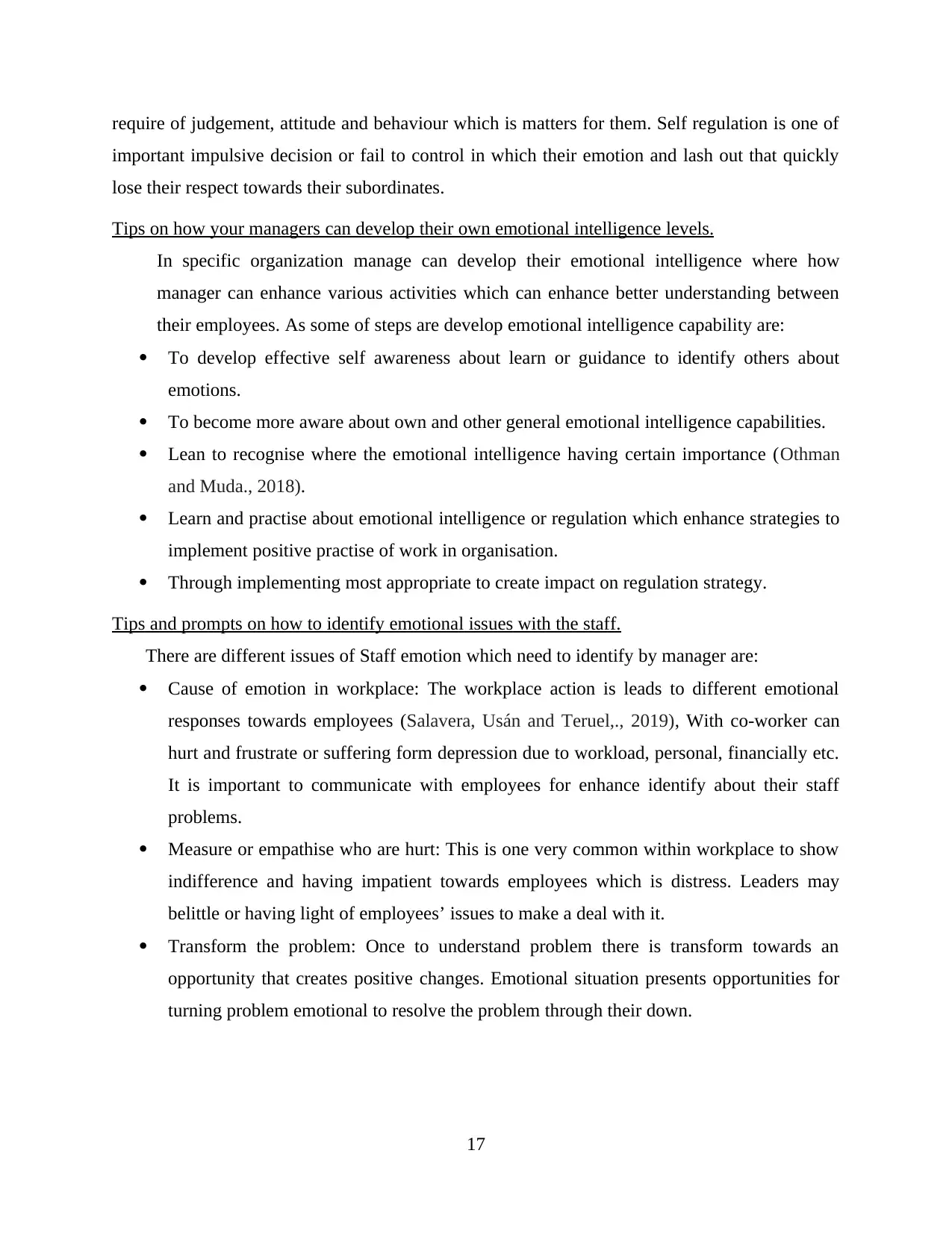
require of judgement, attitude and behaviour which is matters for them. Self regulation is one of
important impulsive decision or fail to control in which their emotion and lash out that quickly
lose their respect towards their subordinates.
Tips on how your managers can develop their own emotional intelligence levels.
In specific organization manage can develop their emotional intelligence where how
manager can enhance various activities which can enhance better understanding between
their employees. As some of steps are develop emotional intelligence capability are:
To develop effective self awareness about learn or guidance to identify others about
emotions.
To become more aware about own and other general emotional intelligence capabilities.
Lean to recognise where the emotional intelligence having certain importance (Othman
and Muda., 2018).
Learn and practise about emotional intelligence or regulation which enhance strategies to
implement positive practise of work in organisation.
Through implementing most appropriate to create impact on regulation strategy.
Tips and prompts on how to identify emotional issues with the staff.
There are different issues of Staff emotion which need to identify by manager are:
Cause of emotion in workplace: The workplace action is leads to different emotional
responses towards employees (Salavera, Usán and Teruel,., 2019), With co-worker can
hurt and frustrate or suffering form depression due to workload, personal, financially etc.
It is important to communicate with employees for enhance identify about their staff
problems.
Measure or empathise who are hurt: This is one very common within workplace to show
indifference and having impatient towards employees which is distress. Leaders may
belittle or having light of employees’ issues to make a deal with it.
Transform the problem: Once to understand problem there is transform towards an
opportunity that creates positive changes. Emotional situation presents opportunities for
turning problem emotional to resolve the problem through their down.
17
important impulsive decision or fail to control in which their emotion and lash out that quickly
lose their respect towards their subordinates.
Tips on how your managers can develop their own emotional intelligence levels.
In specific organization manage can develop their emotional intelligence where how
manager can enhance various activities which can enhance better understanding between
their employees. As some of steps are develop emotional intelligence capability are:
To develop effective self awareness about learn or guidance to identify others about
emotions.
To become more aware about own and other general emotional intelligence capabilities.
Lean to recognise where the emotional intelligence having certain importance (Othman
and Muda., 2018).
Learn and practise about emotional intelligence or regulation which enhance strategies to
implement positive practise of work in organisation.
Through implementing most appropriate to create impact on regulation strategy.
Tips and prompts on how to identify emotional issues with the staff.
There are different issues of Staff emotion which need to identify by manager are:
Cause of emotion in workplace: The workplace action is leads to different emotional
responses towards employees (Salavera, Usán and Teruel,., 2019), With co-worker can
hurt and frustrate or suffering form depression due to workload, personal, financially etc.
It is important to communicate with employees for enhance identify about their staff
problems.
Measure or empathise who are hurt: This is one very common within workplace to show
indifference and having impatient towards employees which is distress. Leaders may
belittle or having light of employees’ issues to make a deal with it.
Transform the problem: Once to understand problem there is transform towards an
opportunity that creates positive changes. Emotional situation presents opportunities for
turning problem emotional to resolve the problem through their down.
17
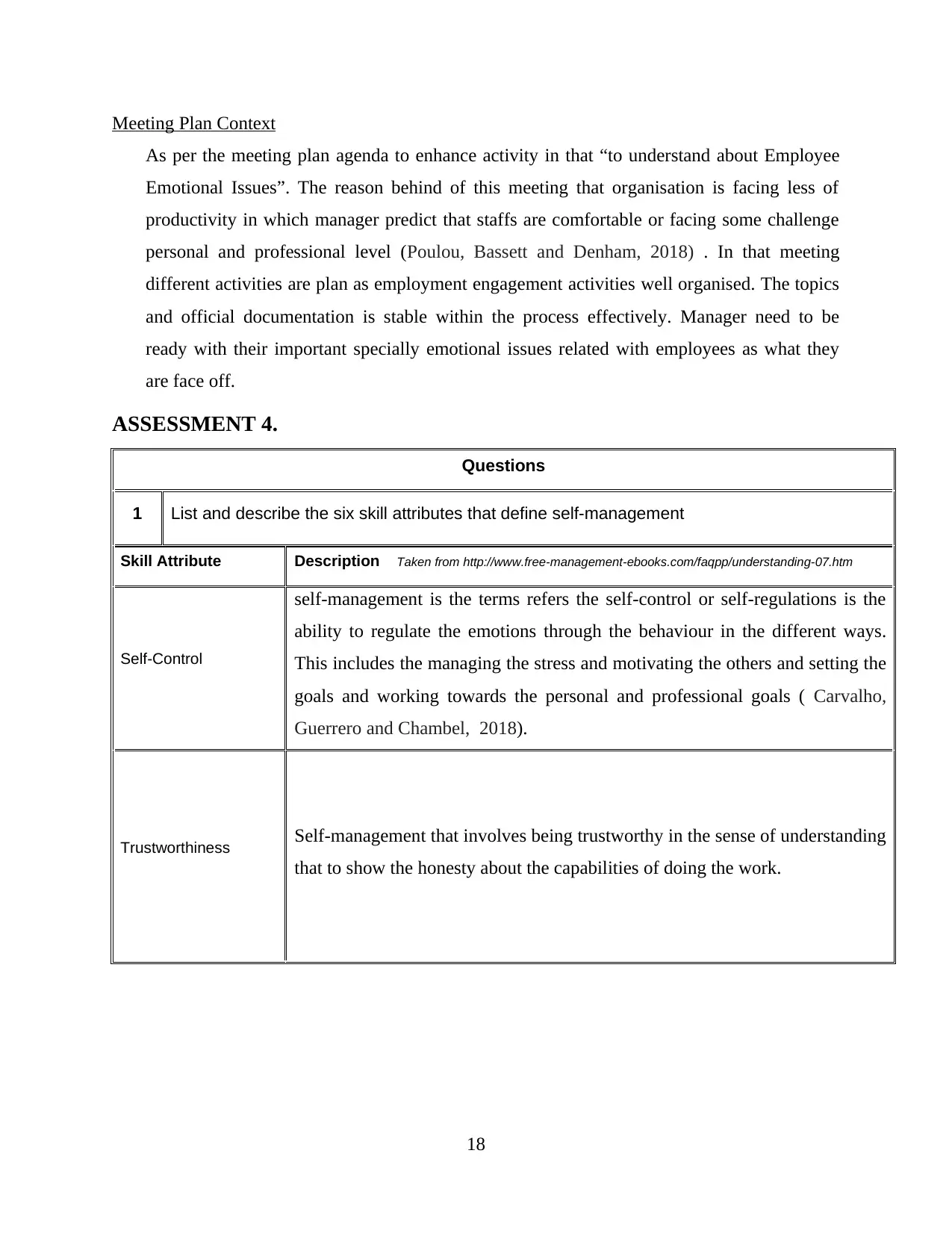
Meeting Plan Context
As per the meeting plan agenda to enhance activity in that “to understand about Employee
Emotional Issues”. The reason behind of this meeting that organisation is facing less of
productivity in which manager predict that staffs are comfortable or facing some challenge
personal and professional level (Poulou, Bassett and Denham, 2018) . In that meeting
different activities are plan as employment engagement activities well organised. The topics
and official documentation is stable within the process effectively. Manager need to be
ready with their important specially emotional issues related with employees as what they
are face off.
ASSESSMENT 4.
Questions
1 List and describe the six skill attributes that define self-management
Skill Attribute Description Taken from http://www.free-management-ebooks.com/faqpp/understanding-07.htm
Self-Control
self-management is the terms refers the self-control or self-regulations is the
ability to regulate the emotions through the behaviour in the different ways.
This includes the managing the stress and motivating the others and setting the
goals and working towards the personal and professional goals ( Carvalho,
Guerrero and Chambel, 2018).
Trustworthiness Self-management that involves being trustworthy in the sense of understanding
that to show the honesty about the capabilities of doing the work.
18
As per the meeting plan agenda to enhance activity in that “to understand about Employee
Emotional Issues”. The reason behind of this meeting that organisation is facing less of
productivity in which manager predict that staffs are comfortable or facing some challenge
personal and professional level (Poulou, Bassett and Denham, 2018) . In that meeting
different activities are plan as employment engagement activities well organised. The topics
and official documentation is stable within the process effectively. Manager need to be
ready with their important specially emotional issues related with employees as what they
are face off.
ASSESSMENT 4.
Questions
1 List and describe the six skill attributes that define self-management
Skill Attribute Description Taken from http://www.free-management-ebooks.com/faqpp/understanding-07.htm
Self-Control
self-management is the terms refers the self-control or self-regulations is the
ability to regulate the emotions through the behaviour in the different ways.
This includes the managing the stress and motivating the others and setting the
goals and working towards the personal and professional goals ( Carvalho,
Guerrero and Chambel, 2018).
Trustworthiness Self-management that involves being trustworthy in the sense of understanding
that to show the honesty about the capabilities of doing the work.
18
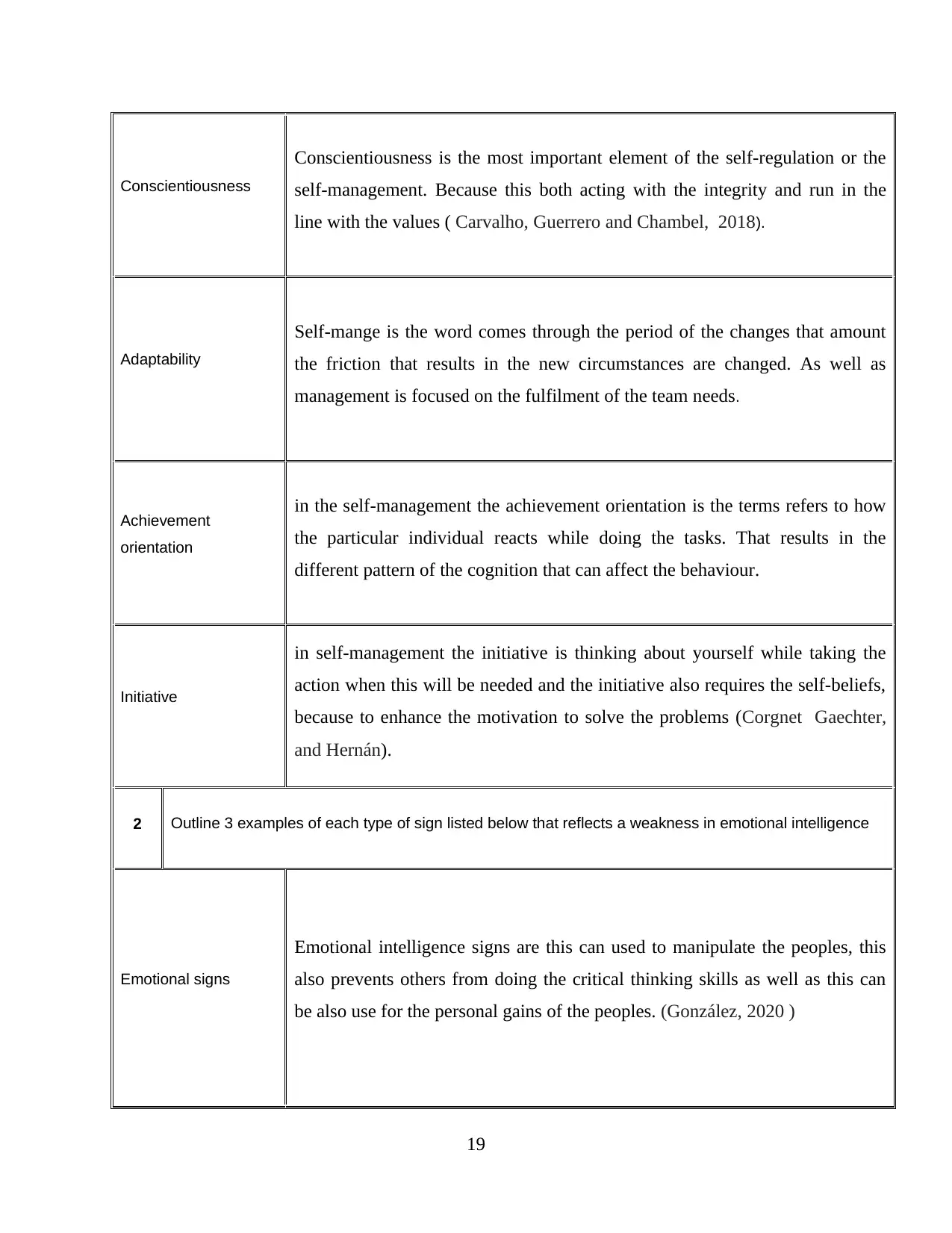
Conscientiousness
Conscientiousness is the most important element of the self-regulation or the
self-management. Because this both acting with the integrity and run in the
line with the values ( Carvalho, Guerrero and Chambel, 2018).
Adaptability
Self-mange is the word comes through the period of the changes that amount
the friction that results in the new circumstances are changed. As well as
management is focused on the fulfilment of the team needs.
Achievement
orientation
in the self-management the achievement orientation is the terms refers to how
the particular individual reacts while doing the tasks. That results in the
different pattern of the cognition that can affect the behaviour.
Initiative
in self-management the initiative is thinking about yourself while taking the
action when this will be needed and the initiative also requires the self-beliefs,
because to enhance the motivation to solve the problems (Corgnet Gaechter,
and Hernán).
2 Outline 3 examples of each type of sign listed below that reflects a weakness in emotional intelligence
Emotional signs
Emotional intelligence signs are this can used to manipulate the peoples, this
also prevents others from doing the critical thinking skills as well as this can
be also use for the personal gains of the peoples. (González, 2020 )
19
Conscientiousness is the most important element of the self-regulation or the
self-management. Because this both acting with the integrity and run in the
line with the values ( Carvalho, Guerrero and Chambel, 2018).
Adaptability
Self-mange is the word comes through the period of the changes that amount
the friction that results in the new circumstances are changed. As well as
management is focused on the fulfilment of the team needs.
Achievement
orientation
in the self-management the achievement orientation is the terms refers to how
the particular individual reacts while doing the tasks. That results in the
different pattern of the cognition that can affect the behaviour.
Initiative
in self-management the initiative is thinking about yourself while taking the
action when this will be needed and the initiative also requires the self-beliefs,
because to enhance the motivation to solve the problems (Corgnet Gaechter,
and Hernán).
2 Outline 3 examples of each type of sign listed below that reflects a weakness in emotional intelligence
Emotional signs
Emotional intelligence signs are this can used to manipulate the peoples, this
also prevents others from doing the critical thinking skills as well as this can
be also use for the personal gains of the peoples. (González, 2020 )
19
Paraphrase This Document
Need a fresh take? Get an instant paraphrase of this document with our AI Paraphraser
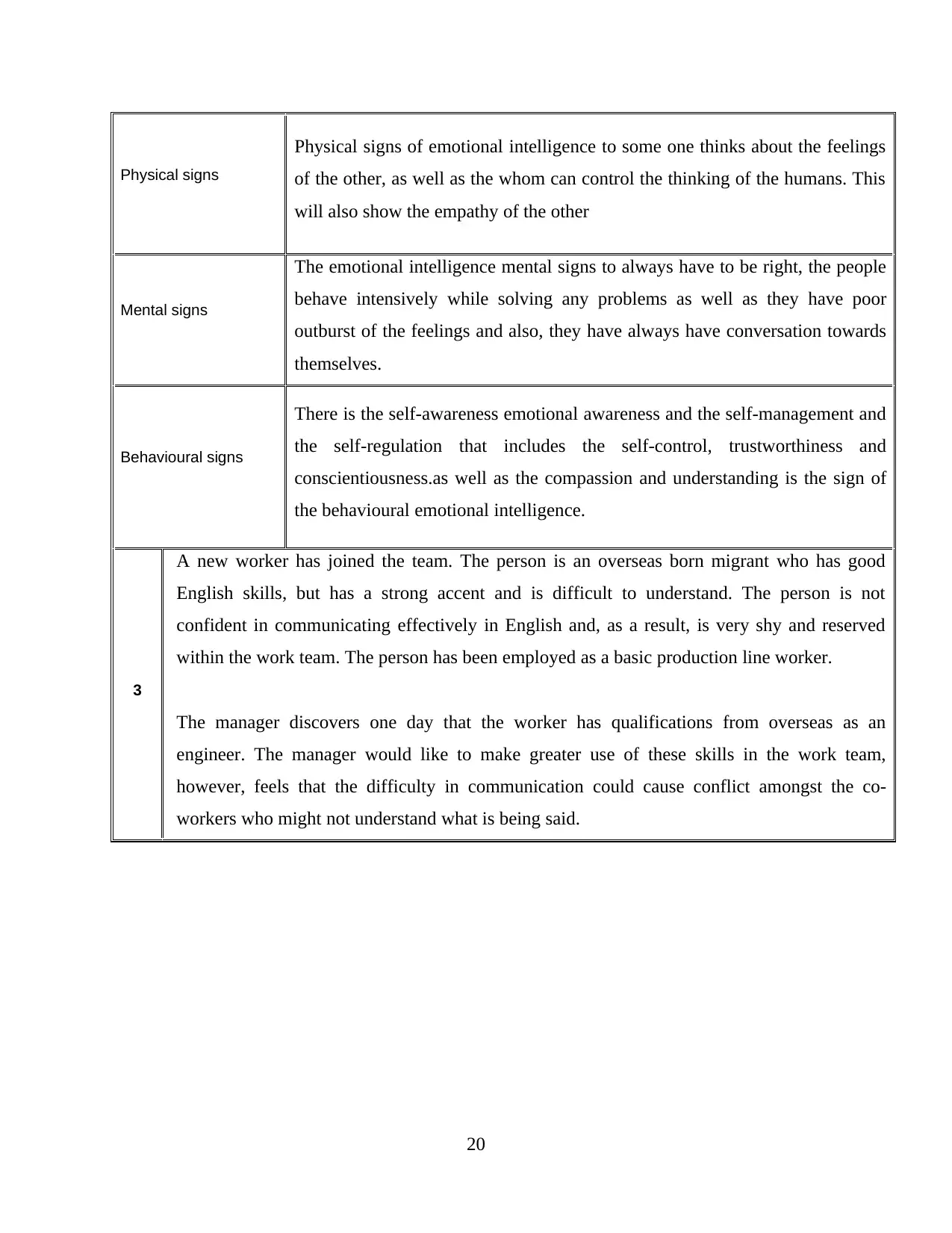
Physical signs
Physical signs of emotional intelligence to some one thinks about the feelings
of the other, as well as the whom can control the thinking of the humans. This
will also show the empathy of the other
Mental signs
The emotional intelligence mental signs to always have to be right, the people
behave intensively while solving any problems as well as they have poor
outburst of the feelings and also, they have always have conversation towards
themselves.
Behavioural signs
There is the self-awareness emotional awareness and the self-management and
the self-regulation that includes the self-control, trustworthiness and
conscientiousness.as well as the compassion and understanding is the sign of
the behavioural emotional intelligence.
3
A new worker has joined the team. The person is an overseas born migrant who has good
English skills, but has a strong accent and is difficult to understand. The person is not
confident in communicating effectively in English and, as a result, is very shy and reserved
within the work team. The person has been employed as a basic production line worker.
The manager discovers one day that the worker has qualifications from overseas as an
engineer. The manager would like to make greater use of these skills in the work team,
however, feels that the difficulty in communication could cause conflict amongst the co-
workers who might not understand what is being said.
20
Physical signs of emotional intelligence to some one thinks about the feelings
of the other, as well as the whom can control the thinking of the humans. This
will also show the empathy of the other
Mental signs
The emotional intelligence mental signs to always have to be right, the people
behave intensively while solving any problems as well as they have poor
outburst of the feelings and also, they have always have conversation towards
themselves.
Behavioural signs
There is the self-awareness emotional awareness and the self-management and
the self-regulation that includes the self-control, trustworthiness and
conscientiousness.as well as the compassion and understanding is the sign of
the behavioural emotional intelligence.
3
A new worker has joined the team. The person is an overseas born migrant who has good
English skills, but has a strong accent and is difficult to understand. The person is not
confident in communicating effectively in English and, as a result, is very shy and reserved
within the work team. The person has been employed as a basic production line worker.
The manager discovers one day that the worker has qualifications from overseas as an
engineer. The manager would like to make greater use of these skills in the work team,
however, feels that the difficulty in communication could cause conflict amongst the co-
workers who might not understand what is being said.
20
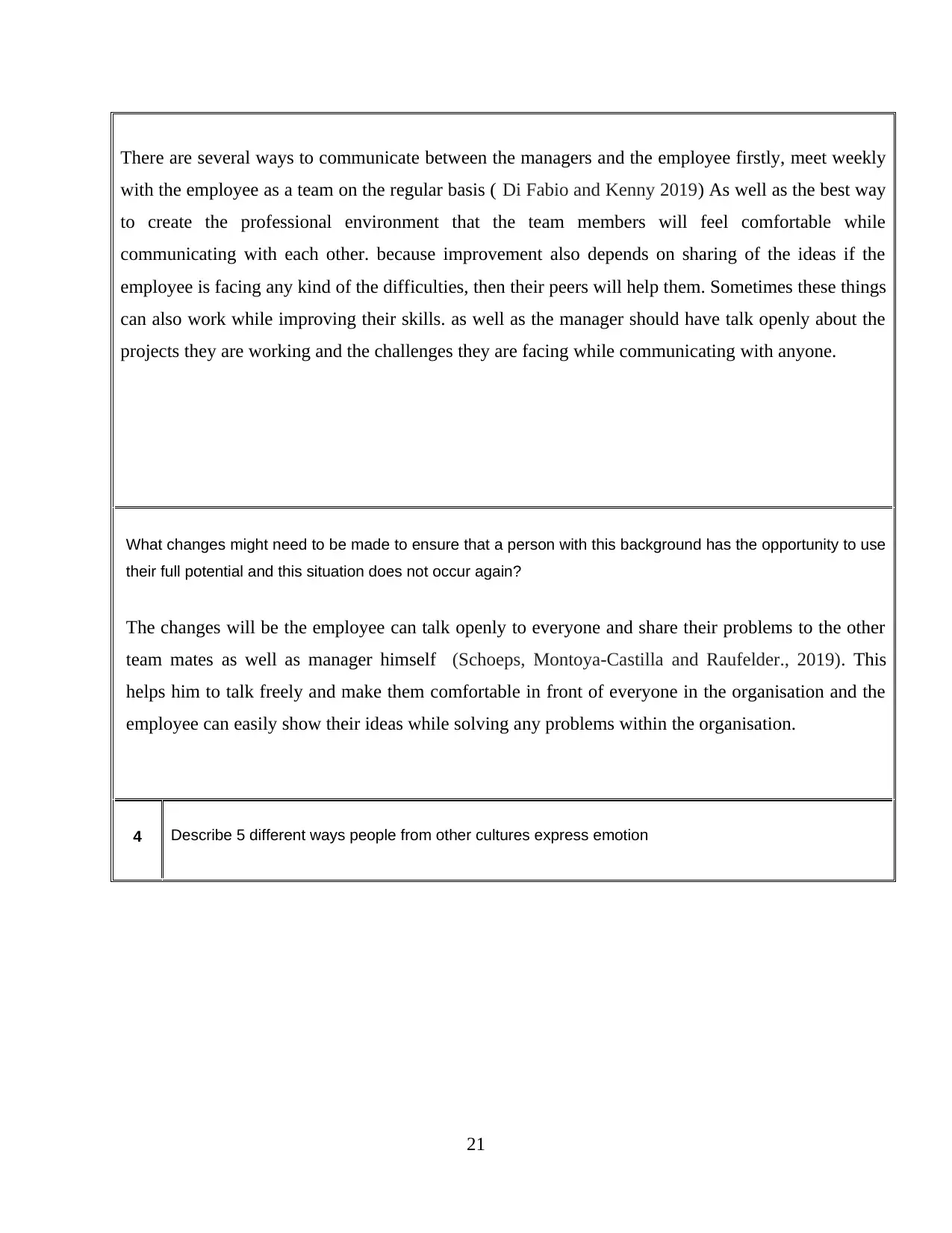
There are several ways to communicate between the managers and the employee firstly, meet weekly
with the employee as a team on the regular basis ( Di Fabio and Kenny 2019) As well as the best way
to create the professional environment that the team members will feel comfortable while
communicating with each other. because improvement also depends on sharing of the ideas if the
employee is facing any kind of the difficulties, then their peers will help them. Sometimes these things
can also work while improving their skills. as well as the manager should have talk openly about the
projects they are working and the challenges they are facing while communicating with anyone.
What changes might need to be made to ensure that a person with this background has the opportunity to use
their full potential and this situation does not occur again?
The changes will be the employee can talk openly to everyone and share their problems to the other
team mates as well as manager himself (Schoeps, Montoya‐Castilla and Raufelder., 2019). This
helps him to talk freely and make them comfortable in front of everyone in the organisation and the
employee can easily show their ideas while solving any problems within the organisation.
4 Describe 5 different ways people from other cultures express emotion
21
with the employee as a team on the regular basis ( Di Fabio and Kenny 2019) As well as the best way
to create the professional environment that the team members will feel comfortable while
communicating with each other. because improvement also depends on sharing of the ideas if the
employee is facing any kind of the difficulties, then their peers will help them. Sometimes these things
can also work while improving their skills. as well as the manager should have talk openly about the
projects they are working and the challenges they are facing while communicating with anyone.
What changes might need to be made to ensure that a person with this background has the opportunity to use
their full potential and this situation does not occur again?
The changes will be the employee can talk openly to everyone and share their problems to the other
team mates as well as manager himself (Schoeps, Montoya‐Castilla and Raufelder., 2019). This
helps him to talk freely and make them comfortable in front of everyone in the organisation and the
employee can easily show their ideas while solving any problems within the organisation.
4 Describe 5 different ways people from other cultures express emotion
21
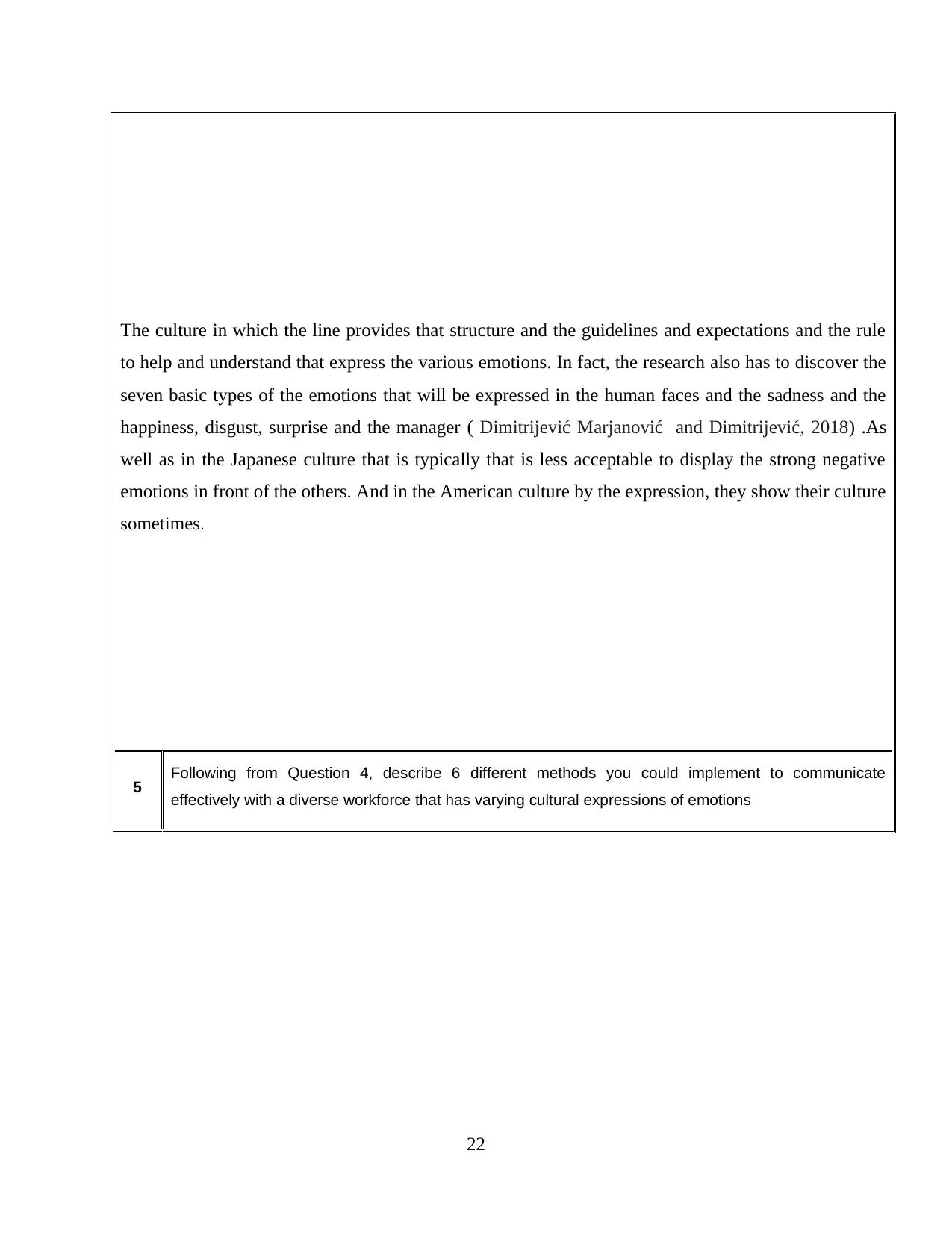
The culture in which the line provides that structure and the guidelines and expectations and the rule
to help and understand that express the various emotions. In fact, the research also has to discover the
seven basic types of the emotions that will be expressed in the human faces and the sadness and the
happiness, disgust, surprise and the manager ( Dimitrijević Marjanović and Dimitrijević, 2018) .As
well as in the Japanese culture that is typically that is less acceptable to display the strong negative
emotions in front of the others. And in the American culture by the expression, they show their culture
sometimes.
5 Following from Question 4, describe 6 different methods you could implement to communicate
effectively with a diverse workforce that has varying cultural expressions of emotions
22
to help and understand that express the various emotions. In fact, the research also has to discover the
seven basic types of the emotions that will be expressed in the human faces and the sadness and the
happiness, disgust, surprise and the manager ( Dimitrijević Marjanović and Dimitrijević, 2018) .As
well as in the Japanese culture that is typically that is less acceptable to display the strong negative
emotions in front of the others. And in the American culture by the expression, they show their culture
sometimes.
5 Following from Question 4, describe 6 different methods you could implement to communicate
effectively with a diverse workforce that has varying cultural expressions of emotions
22
Secure Best Marks with AI Grader
Need help grading? Try our AI Grader for instant feedback on your assignments.
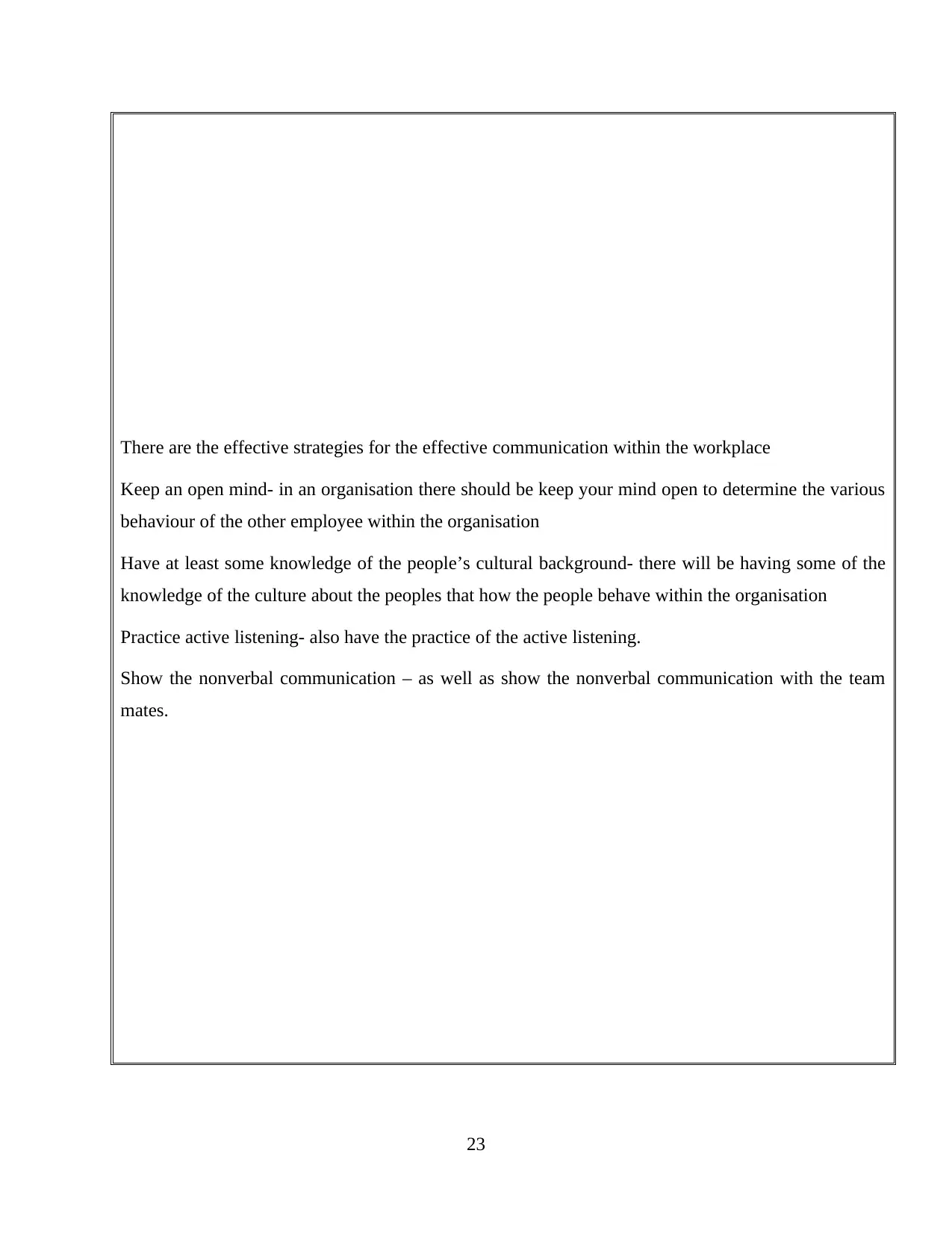
There are the effective strategies for the effective communication within the workplace
Keep an open mind- in an organisation there should be keep your mind open to determine the various
behaviour of the other employee within the organisation
Have at least some knowledge of the people’s cultural background- there will be having some of the
knowledge of the culture about the peoples that how the people behave within the organisation
Practice active listening- also have the practice of the active listening.
Show the nonverbal communication – as well as show the nonverbal communication with the team
mates.
23
Keep an open mind- in an organisation there should be keep your mind open to determine the various
behaviour of the other employee within the organisation
Have at least some knowledge of the people’s cultural background- there will be having some of the
knowledge of the culture about the peoples that how the people behave within the organisation
Practice active listening- also have the practice of the active listening.
Show the nonverbal communication – as well as show the nonverbal communication with the team
mates.
23
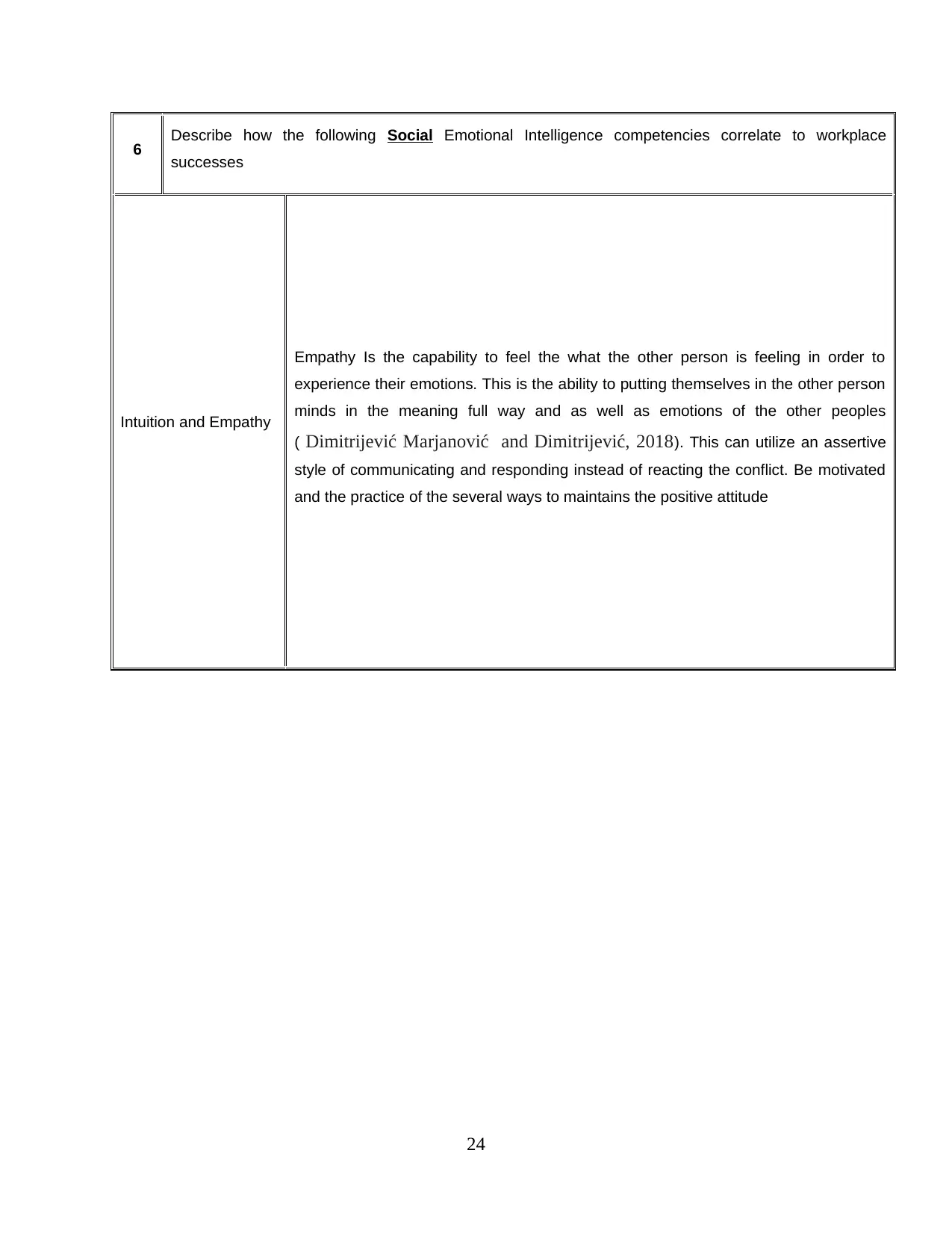
6 Describe how the following Social Emotional Intelligence competencies correlate to workplace
successes
Intuition and Empathy
Empathy Is the capability to feel the what the other person is feeling in order to
experience their emotions. This is the ability to putting themselves in the other person
minds in the meaning full way and as well as emotions of the other peoples
( Dimitrijević Marjanović and Dimitrijević, 2018). This can utilize an assertive
style of communicating and responding instead of reacting the conflict. Be motivated
and the practice of the several ways to maintains the positive attitude
24
successes
Intuition and Empathy
Empathy Is the capability to feel the what the other person is feeling in order to
experience their emotions. This is the ability to putting themselves in the other person
minds in the meaning full way and as well as emotions of the other peoples
( Dimitrijević Marjanović and Dimitrijević, 2018). This can utilize an assertive
style of communicating and responding instead of reacting the conflict. Be motivated
and the practice of the several ways to maintains the positive attitude
24
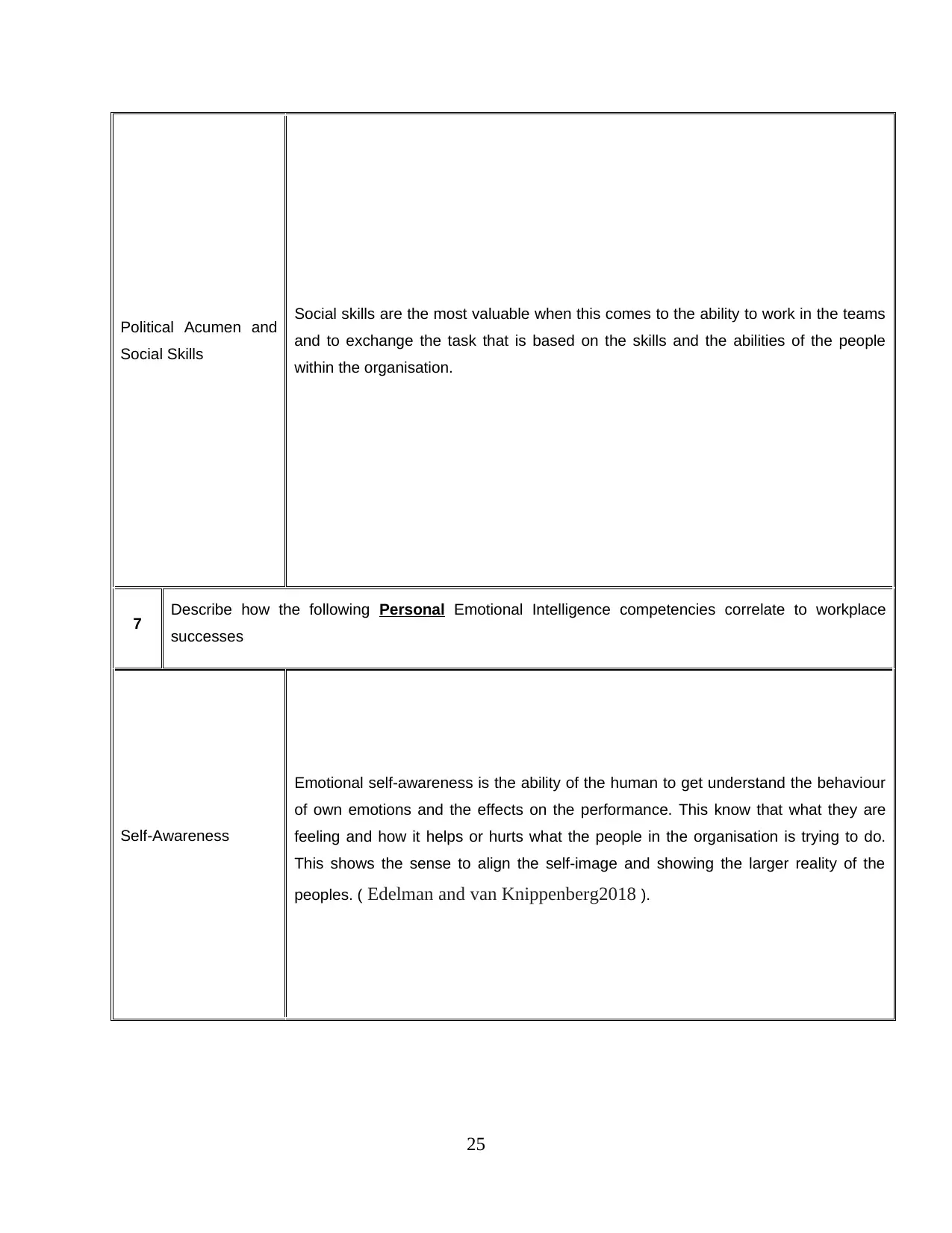
Political Acumen and
Social Skills
Social skills are the most valuable when this comes to the ability to work in the teams
and to exchange the task that is based on the skills and the abilities of the people
within the organisation.
7 Describe how the following Personal Emotional Intelligence competencies correlate to workplace
successes
Self-Awareness
Emotional self-awareness is the ability of the human to get understand the behaviour
of own emotions and the effects on the performance. This know that what they are
feeling and how it helps or hurts what the people in the organisation is trying to do.
This shows the sense to align the self-image and showing the larger reality of the
peoples. ( Edelman and van Knippenberg2018 ).
25
Social Skills
Social skills are the most valuable when this comes to the ability to work in the teams
and to exchange the task that is based on the skills and the abilities of the people
within the organisation.
7 Describe how the following Personal Emotional Intelligence competencies correlate to workplace
successes
Self-Awareness
Emotional self-awareness is the ability of the human to get understand the behaviour
of own emotions and the effects on the performance. This know that what they are
feeling and how it helps or hurts what the people in the organisation is trying to do.
This shows the sense to align the self-image and showing the larger reality of the
peoples. ( Edelman and van Knippenberg2018 ).
25
Paraphrase This Document
Need a fresh take? Get an instant paraphrase of this document with our AI Paraphraser
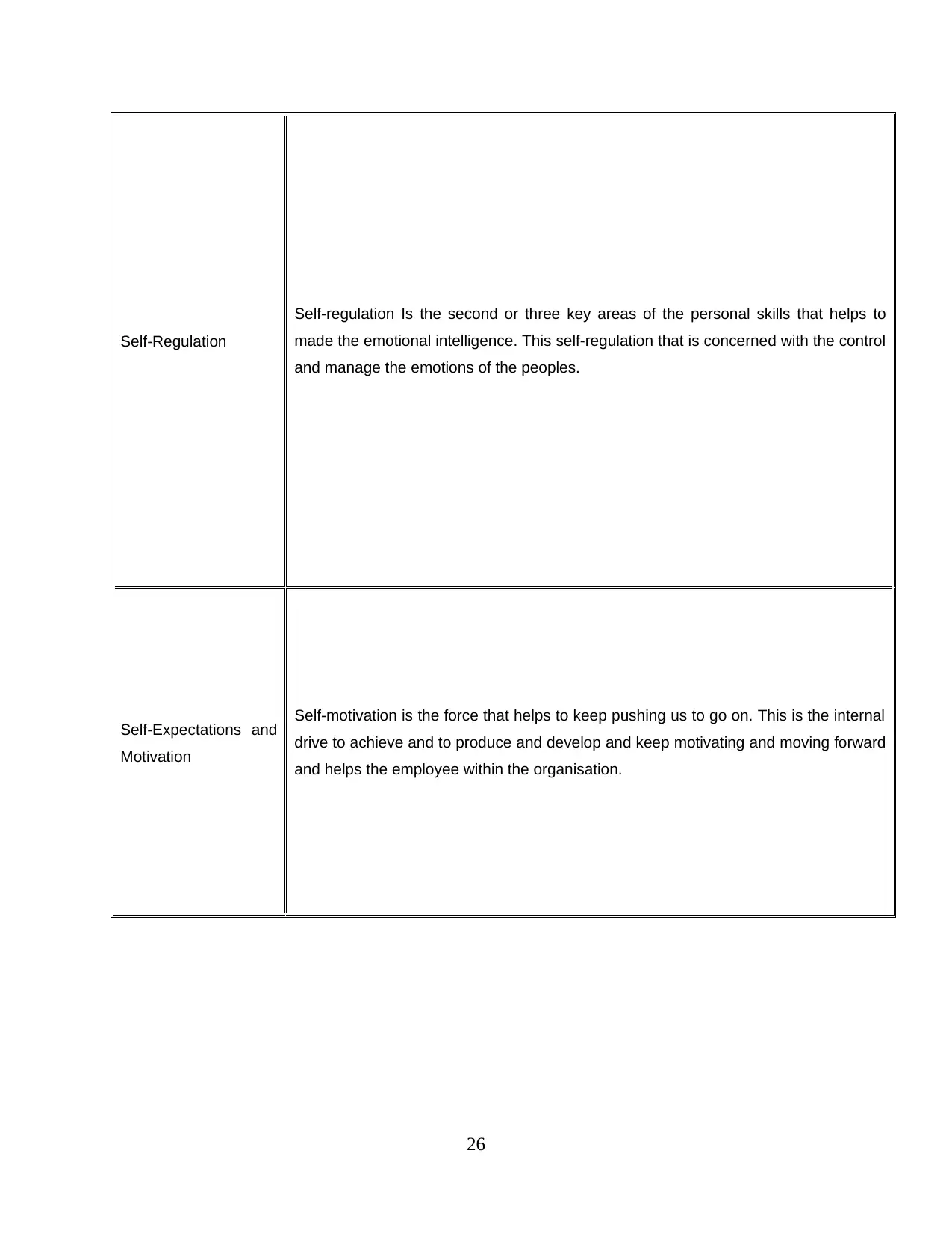
Self-Regulation
Self-regulation Is the second or three key areas of the personal skills that helps to
made the emotional intelligence. This self-regulation that is concerned with the control
and manage the emotions of the peoples.
Self-Expectations and
Motivation
Self-motivation is the force that helps to keep pushing us to go on. This is the internal
drive to achieve and to produce and develop and keep motivating and moving forward
and helps the employee within the organisation.
26
Self-regulation Is the second or three key areas of the personal skills that helps to
made the emotional intelligence. This self-regulation that is concerned with the control
and manage the emotions of the peoples.
Self-Expectations and
Motivation
Self-motivation is the force that helps to keep pushing us to go on. This is the internal
drive to achieve and to produce and develop and keep motivating and moving forward
and helps the employee within the organisation.
26
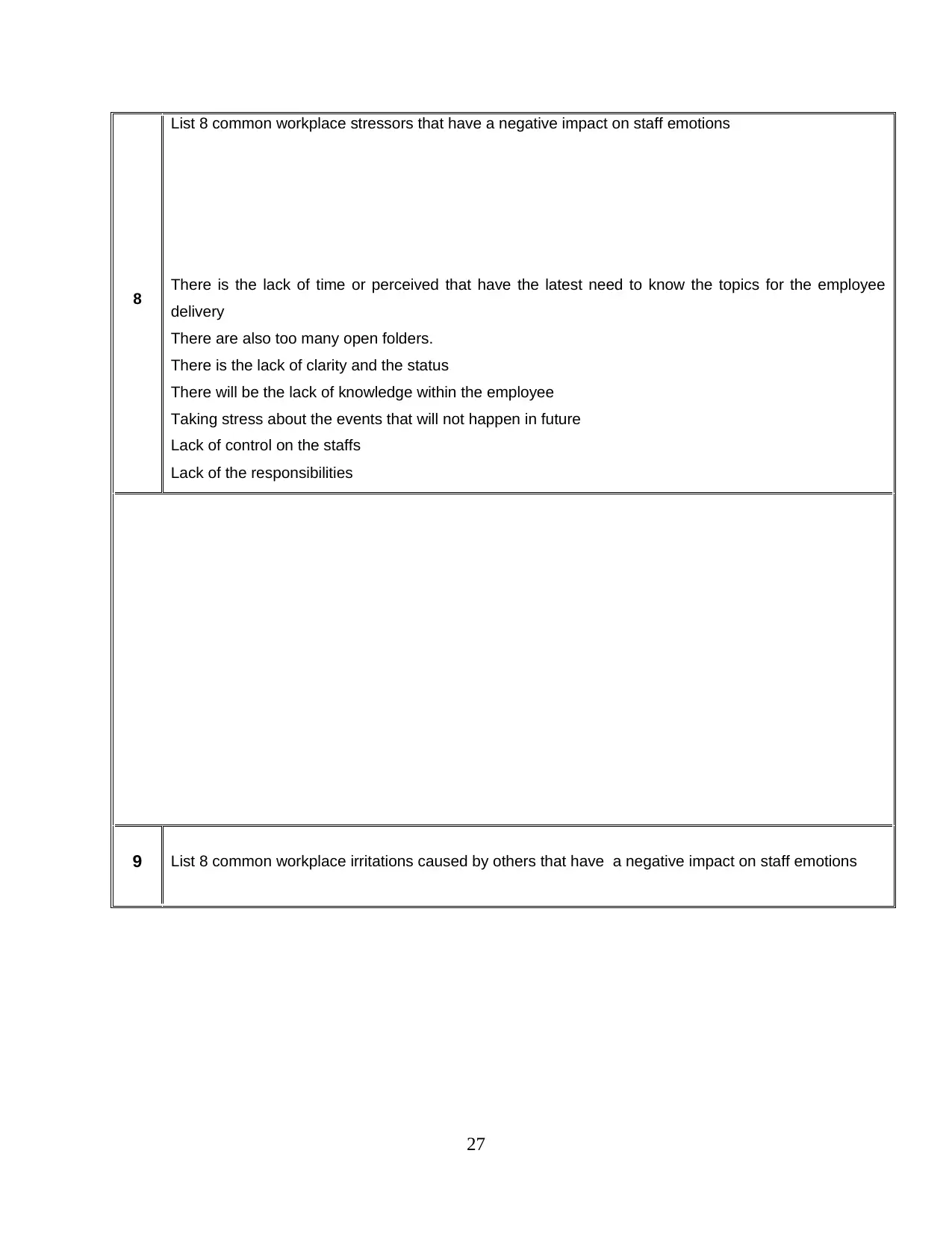
8
List 8 common workplace stressors that have a negative impact on staff emotions
There is the lack of time or perceived that have the latest need to know the topics for the employee
delivery
There are also too many open folders.
There is the lack of clarity and the status
There will be the lack of knowledge within the employee
Taking stress about the events that will not happen in future
Lack of control on the staffs
Lack of the responsibilities
9 List 8 common workplace irritations caused by others that have a negative impact on staff emotions
27
List 8 common workplace stressors that have a negative impact on staff emotions
There is the lack of time or perceived that have the latest need to know the topics for the employee
delivery
There are also too many open folders.
There is the lack of clarity and the status
There will be the lack of knowledge within the employee
Taking stress about the events that will not happen in future
Lack of control on the staffs
Lack of the responsibilities
9 List 8 common workplace irritations caused by others that have a negative impact on staff emotions
27
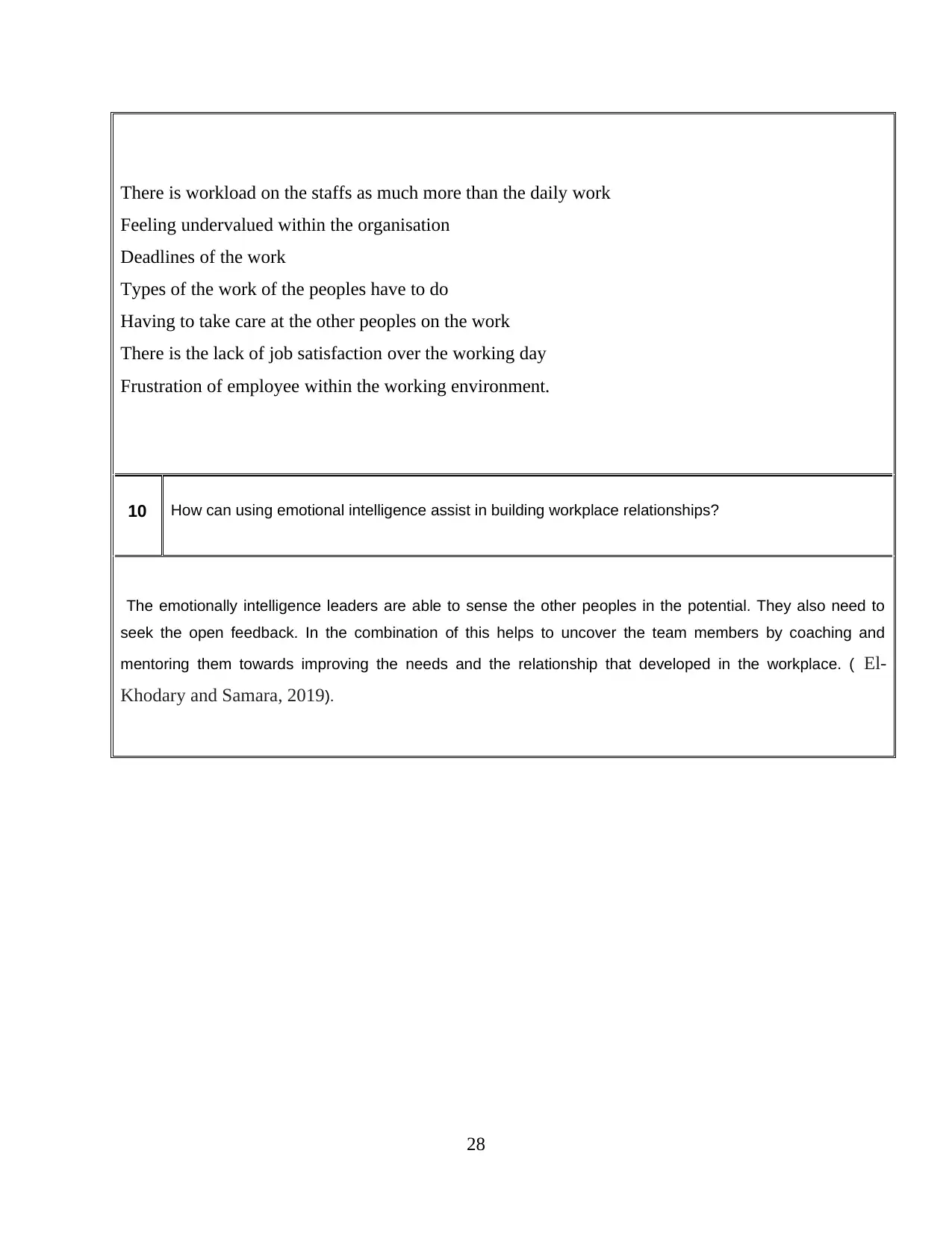
There is workload on the staffs as much more than the daily work
Feeling undervalued within the organisation
Deadlines of the work
Types of the work of the peoples have to do
Having to take care at the other peoples on the work
There is the lack of job satisfaction over the working day
Frustration of employee within the working environment.
10 How can using emotional intelligence assist in building workplace relationships?
The emotionally intelligence leaders are able to sense the other peoples in the potential. They also need to
seek the open feedback. In the combination of this helps to uncover the team members by coaching and
mentoring them towards improving the needs and the relationship that developed in the workplace. ( El-
Khodary and Samara, 2019).
28
Feeling undervalued within the organisation
Deadlines of the work
Types of the work of the peoples have to do
Having to take care at the other peoples on the work
There is the lack of job satisfaction over the working day
Frustration of employee within the working environment.
10 How can using emotional intelligence assist in building workplace relationships?
The emotionally intelligence leaders are able to sense the other peoples in the potential. They also need to
seek the open feedback. In the combination of this helps to uncover the team members by coaching and
mentoring them towards improving the needs and the relationship that developed in the workplace. ( El-
Khodary and Samara, 2019).
28
Secure Best Marks with AI Grader
Need help grading? Try our AI Grader for instant feedback on your assignments.
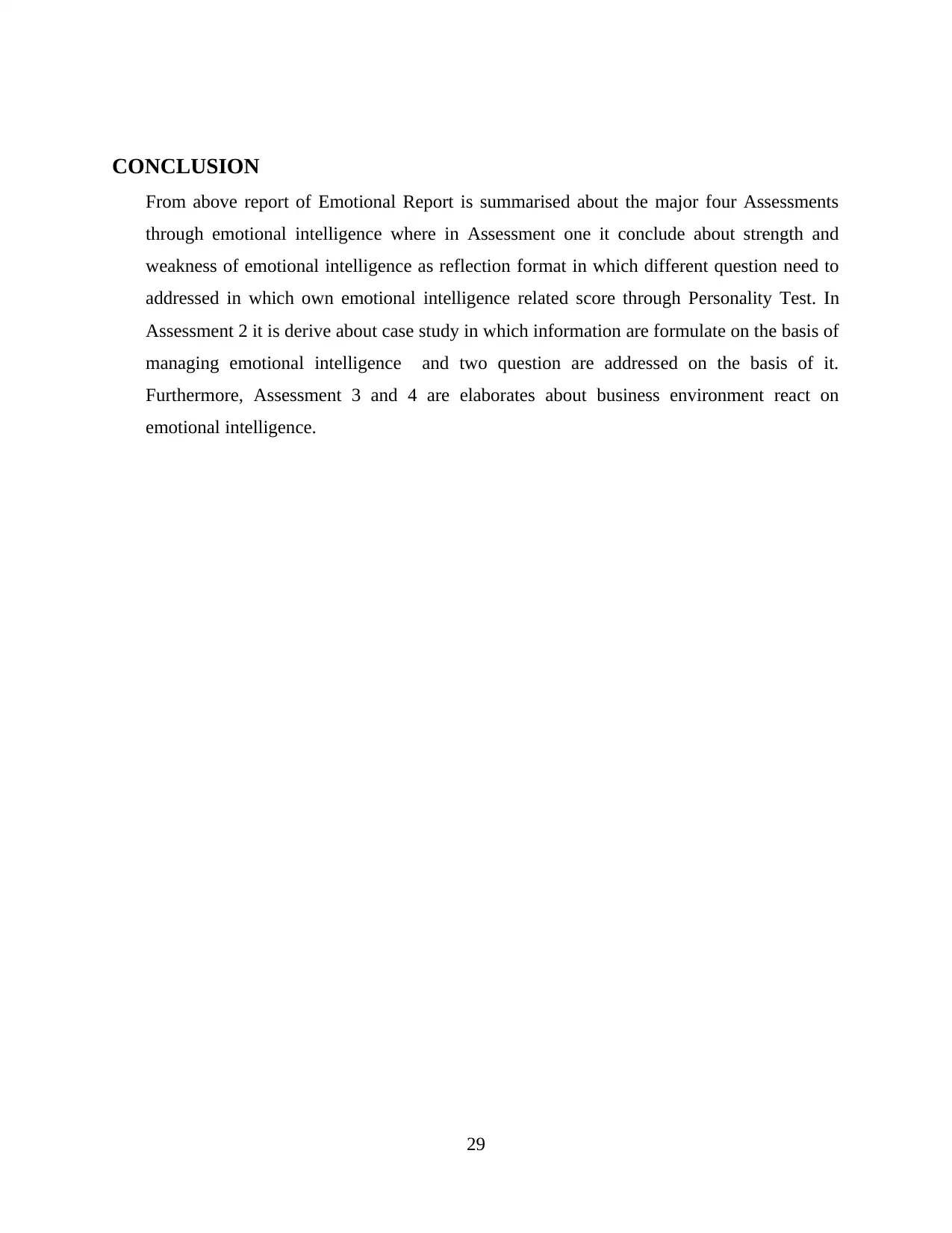
CONCLUSION
From above report of Emotional Report is summarised about the major four Assessments
through emotional intelligence where in Assessment one it conclude about strength and
weakness of emotional intelligence as reflection format in which different question need to
addressed in which own emotional intelligence related score through Personality Test. In
Assessment 2 it is derive about case study in which information are formulate on the basis of
managing emotional intelligence and two question are addressed on the basis of it.
Furthermore, Assessment 3 and 4 are elaborates about business environment react on
emotional intelligence.
29
From above report of Emotional Report is summarised about the major four Assessments
through emotional intelligence where in Assessment one it conclude about strength and
weakness of emotional intelligence as reflection format in which different question need to
addressed in which own emotional intelligence related score through Personality Test. In
Assessment 2 it is derive about case study in which information are formulate on the basis of
managing emotional intelligence and two question are addressed on the basis of it.
Furthermore, Assessment 3 and 4 are elaborates about business environment react on
emotional intelligence.
29
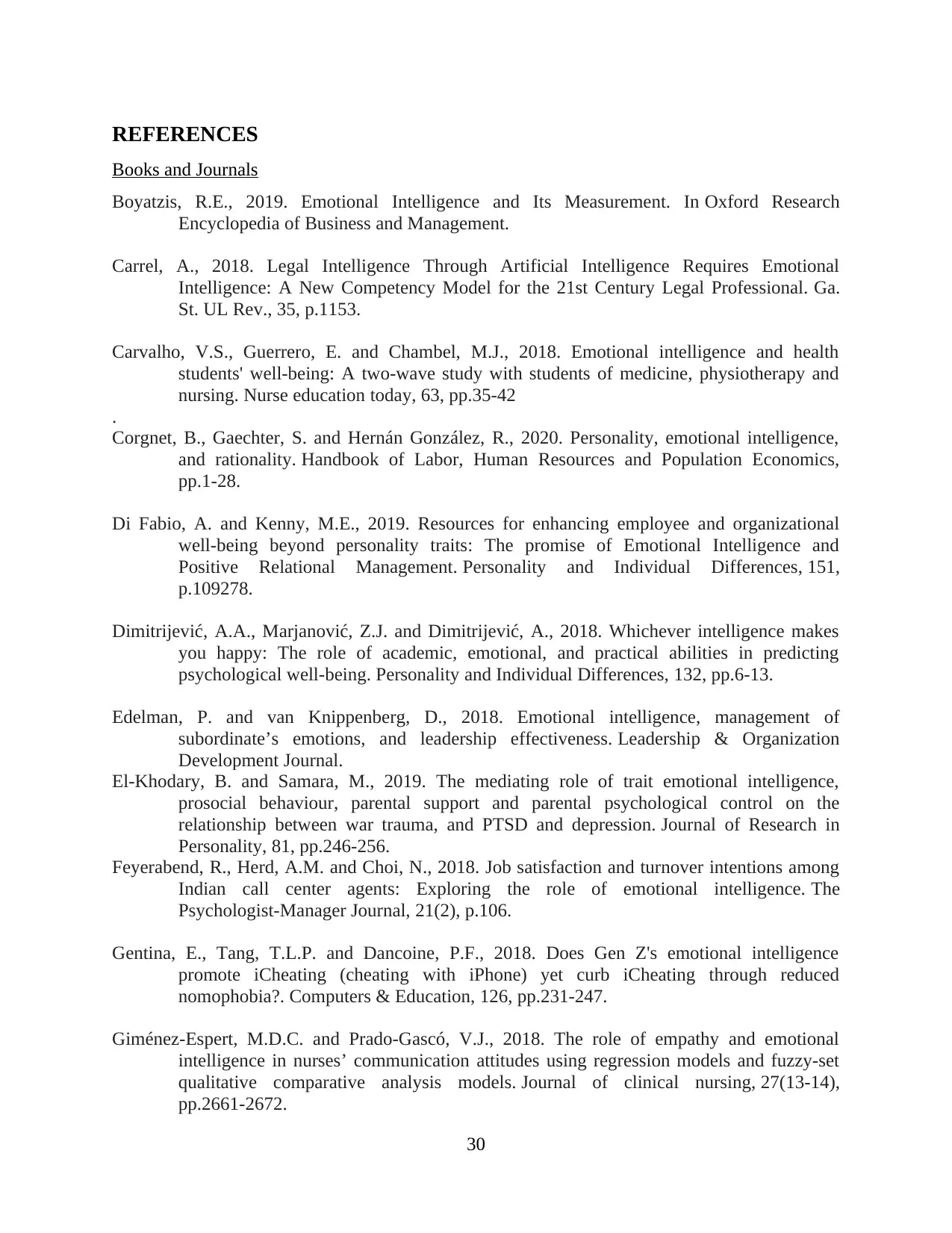
REFERENCES
Books and Journals
Boyatzis, R.E., 2019. Emotional Intelligence and Its Measurement. In Oxford Research
Encyclopedia of Business and Management.
Carrel, A., 2018. Legal Intelligence Through Artificial Intelligence Requires Emotional
Intelligence: A New Competency Model for the 21st Century Legal Professional. Ga.
St. UL Rev., 35, p.1153.
Carvalho, V.S., Guerrero, E. and Chambel, M.J., 2018. Emotional intelligence and health
students' well-being: A two-wave study with students of medicine, physiotherapy and
nursing. Nurse education today, 63, pp.35-42
.
Corgnet, B., Gaechter, S. and Hernán González, R., 2020. Personality, emotional intelligence,
and rationality. Handbook of Labor, Human Resources and Population Economics,
pp.1-28.
Di Fabio, A. and Kenny, M.E., 2019. Resources for enhancing employee and organizational
well-being beyond personality traits: The promise of Emotional Intelligence and
Positive Relational Management. Personality and Individual Differences, 151,
p.109278.
Dimitrijević, A.A., Marjanović, Z.J. and Dimitrijević, A., 2018. Whichever intelligence makes
you happy: The role of academic, emotional, and practical abilities in predicting
psychological well-being. Personality and Individual Differences, 132, pp.6-13.
Edelman, P. and van Knippenberg, D., 2018. Emotional intelligence, management of
subordinate’s emotions, and leadership effectiveness. Leadership & Organization
Development Journal.
El-Khodary, B. and Samara, M., 2019. The mediating role of trait emotional intelligence,
prosocial behaviour, parental support and parental psychological control on the
relationship between war trauma, and PTSD and depression. Journal of Research in
Personality, 81, pp.246-256.
Feyerabend, R., Herd, A.M. and Choi, N., 2018. Job satisfaction and turnover intentions among
Indian call center agents: Exploring the role of emotional intelligence. The
Psychologist-Manager Journal, 21(2), p.106.
Gentina, E., Tang, T.L.P. and Dancoine, P.F., 2018. Does Gen Z's emotional intelligence
promote iCheating (cheating with iPhone) yet curb iCheating through reduced
nomophobia?. Computers & Education, 126, pp.231-247.
Giménez‐Espert, M.D.C. and Prado‐Gascó, V.J., 2018. The role of empathy and emotional
intelligence in nurses’ communication attitudes using regression models and fuzzy‐set
qualitative comparative analysis models. Journal of clinical nursing, 27(13-14),
pp.2661-2672.
30
Books and Journals
Boyatzis, R.E., 2019. Emotional Intelligence and Its Measurement. In Oxford Research
Encyclopedia of Business and Management.
Carrel, A., 2018. Legal Intelligence Through Artificial Intelligence Requires Emotional
Intelligence: A New Competency Model for the 21st Century Legal Professional. Ga.
St. UL Rev., 35, p.1153.
Carvalho, V.S., Guerrero, E. and Chambel, M.J., 2018. Emotional intelligence and health
students' well-being: A two-wave study with students of medicine, physiotherapy and
nursing. Nurse education today, 63, pp.35-42
.
Corgnet, B., Gaechter, S. and Hernán González, R., 2020. Personality, emotional intelligence,
and rationality. Handbook of Labor, Human Resources and Population Economics,
pp.1-28.
Di Fabio, A. and Kenny, M.E., 2019. Resources for enhancing employee and organizational
well-being beyond personality traits: The promise of Emotional Intelligence and
Positive Relational Management. Personality and Individual Differences, 151,
p.109278.
Dimitrijević, A.A., Marjanović, Z.J. and Dimitrijević, A., 2018. Whichever intelligence makes
you happy: The role of academic, emotional, and practical abilities in predicting
psychological well-being. Personality and Individual Differences, 132, pp.6-13.
Edelman, P. and van Knippenberg, D., 2018. Emotional intelligence, management of
subordinate’s emotions, and leadership effectiveness. Leadership & Organization
Development Journal.
El-Khodary, B. and Samara, M., 2019. The mediating role of trait emotional intelligence,
prosocial behaviour, parental support and parental psychological control on the
relationship between war trauma, and PTSD and depression. Journal of Research in
Personality, 81, pp.246-256.
Feyerabend, R., Herd, A.M. and Choi, N., 2018. Job satisfaction and turnover intentions among
Indian call center agents: Exploring the role of emotional intelligence. The
Psychologist-Manager Journal, 21(2), p.106.
Gentina, E., Tang, T.L.P. and Dancoine, P.F., 2018. Does Gen Z's emotional intelligence
promote iCheating (cheating with iPhone) yet curb iCheating through reduced
nomophobia?. Computers & Education, 126, pp.231-247.
Giménez‐Espert, M.D.C. and Prado‐Gascó, V.J., 2018. The role of empathy and emotional
intelligence in nurses’ communication attitudes using regression models and fuzzy‐set
qualitative comparative analysis models. Journal of clinical nursing, 27(13-14),
pp.2661-2672.
30
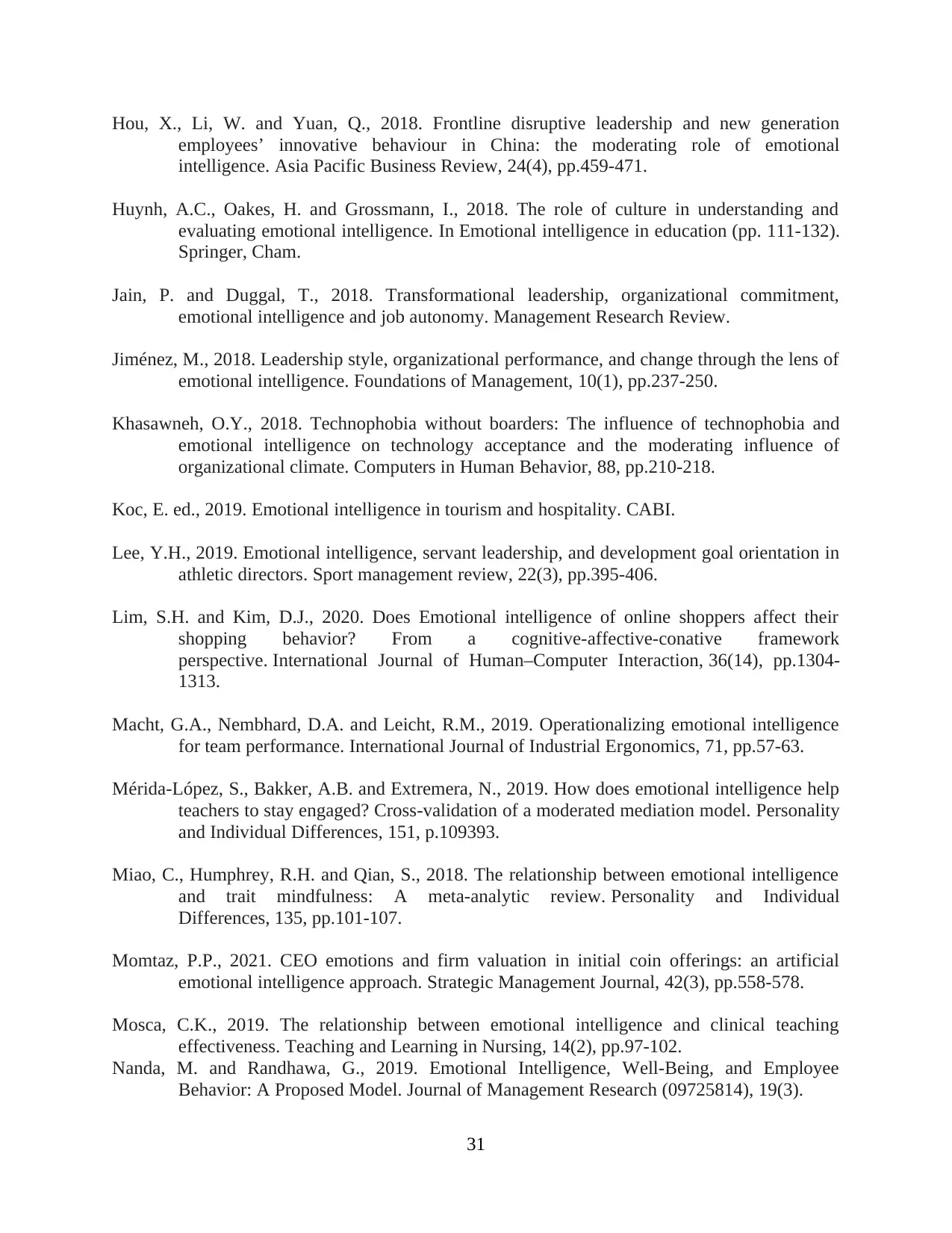
Hou, X., Li, W. and Yuan, Q., 2018. Frontline disruptive leadership and new generation
employees’ innovative behaviour in China: the moderating role of emotional
intelligence. Asia Pacific Business Review, 24(4), pp.459-471.
Huynh, A.C., Oakes, H. and Grossmann, I., 2018. The role of culture in understanding and
evaluating emotional intelligence. In Emotional intelligence in education (pp. 111-132).
Springer, Cham.
Jain, P. and Duggal, T., 2018. Transformational leadership, organizational commitment,
emotional intelligence and job autonomy. Management Research Review.
Jiménez, M., 2018. Leadership style, organizational performance, and change through the lens of
emotional intelligence. Foundations of Management, 10(1), pp.237-250.
Khasawneh, O.Y., 2018. Technophobia without boarders: The influence of technophobia and
emotional intelligence on technology acceptance and the moderating influence of
organizational climate. Computers in Human Behavior, 88, pp.210-218.
Koc, E. ed., 2019. Emotional intelligence in tourism and hospitality. CABI.
Lee, Y.H., 2019. Emotional intelligence, servant leadership, and development goal orientation in
athletic directors. Sport management review, 22(3), pp.395-406.
Lim, S.H. and Kim, D.J., 2020. Does Emotional intelligence of online shoppers affect their
shopping behavior? From a cognitive-affective-conative framework
perspective. International Journal of Human–Computer Interaction, 36(14), pp.1304-
1313.
Macht, G.A., Nembhard, D.A. and Leicht, R.M., 2019. Operationalizing emotional intelligence
for team performance. International Journal of Industrial Ergonomics, 71, pp.57-63.
Mérida-López, S., Bakker, A.B. and Extremera, N., 2019. How does emotional intelligence help
teachers to stay engaged? Cross-validation of a moderated mediation model. Personality
and Individual Differences, 151, p.109393.
Miao, C., Humphrey, R.H. and Qian, S., 2018. The relationship between emotional intelligence
and trait mindfulness: A meta-analytic review. Personality and Individual
Differences, 135, pp.101-107.
Momtaz, P.P., 2021. CEO emotions and firm valuation in initial coin offerings: an artificial
emotional intelligence approach. Strategic Management Journal, 42(3), pp.558-578.
Mosca, C.K., 2019. The relationship between emotional intelligence and clinical teaching
effectiveness. Teaching and Learning in Nursing, 14(2), pp.97-102.
Nanda, M. and Randhawa, G., 2019. Emotional Intelligence, Well-Being, and Employee
Behavior: A Proposed Model. Journal of Management Research (09725814), 19(3).
31
employees’ innovative behaviour in China: the moderating role of emotional
intelligence. Asia Pacific Business Review, 24(4), pp.459-471.
Huynh, A.C., Oakes, H. and Grossmann, I., 2018. The role of culture in understanding and
evaluating emotional intelligence. In Emotional intelligence in education (pp. 111-132).
Springer, Cham.
Jain, P. and Duggal, T., 2018. Transformational leadership, organizational commitment,
emotional intelligence and job autonomy. Management Research Review.
Jiménez, M., 2018. Leadership style, organizational performance, and change through the lens of
emotional intelligence. Foundations of Management, 10(1), pp.237-250.
Khasawneh, O.Y., 2018. Technophobia without boarders: The influence of technophobia and
emotional intelligence on technology acceptance and the moderating influence of
organizational climate. Computers in Human Behavior, 88, pp.210-218.
Koc, E. ed., 2019. Emotional intelligence in tourism and hospitality. CABI.
Lee, Y.H., 2019. Emotional intelligence, servant leadership, and development goal orientation in
athletic directors. Sport management review, 22(3), pp.395-406.
Lim, S.H. and Kim, D.J., 2020. Does Emotional intelligence of online shoppers affect their
shopping behavior? From a cognitive-affective-conative framework
perspective. International Journal of Human–Computer Interaction, 36(14), pp.1304-
1313.
Macht, G.A., Nembhard, D.A. and Leicht, R.M., 2019. Operationalizing emotional intelligence
for team performance. International Journal of Industrial Ergonomics, 71, pp.57-63.
Mérida-López, S., Bakker, A.B. and Extremera, N., 2019. How does emotional intelligence help
teachers to stay engaged? Cross-validation of a moderated mediation model. Personality
and Individual Differences, 151, p.109393.
Miao, C., Humphrey, R.H. and Qian, S., 2018. The relationship between emotional intelligence
and trait mindfulness: A meta-analytic review. Personality and Individual
Differences, 135, pp.101-107.
Momtaz, P.P., 2021. CEO emotions and firm valuation in initial coin offerings: an artificial
emotional intelligence approach. Strategic Management Journal, 42(3), pp.558-578.
Mosca, C.K., 2019. The relationship between emotional intelligence and clinical teaching
effectiveness. Teaching and Learning in Nursing, 14(2), pp.97-102.
Nanda, M. and Randhawa, G., 2019. Emotional Intelligence, Well-Being, and Employee
Behavior: A Proposed Model. Journal of Management Research (09725814), 19(3).
31
Paraphrase This Document
Need a fresh take? Get an instant paraphrase of this document with our AI Paraphraser
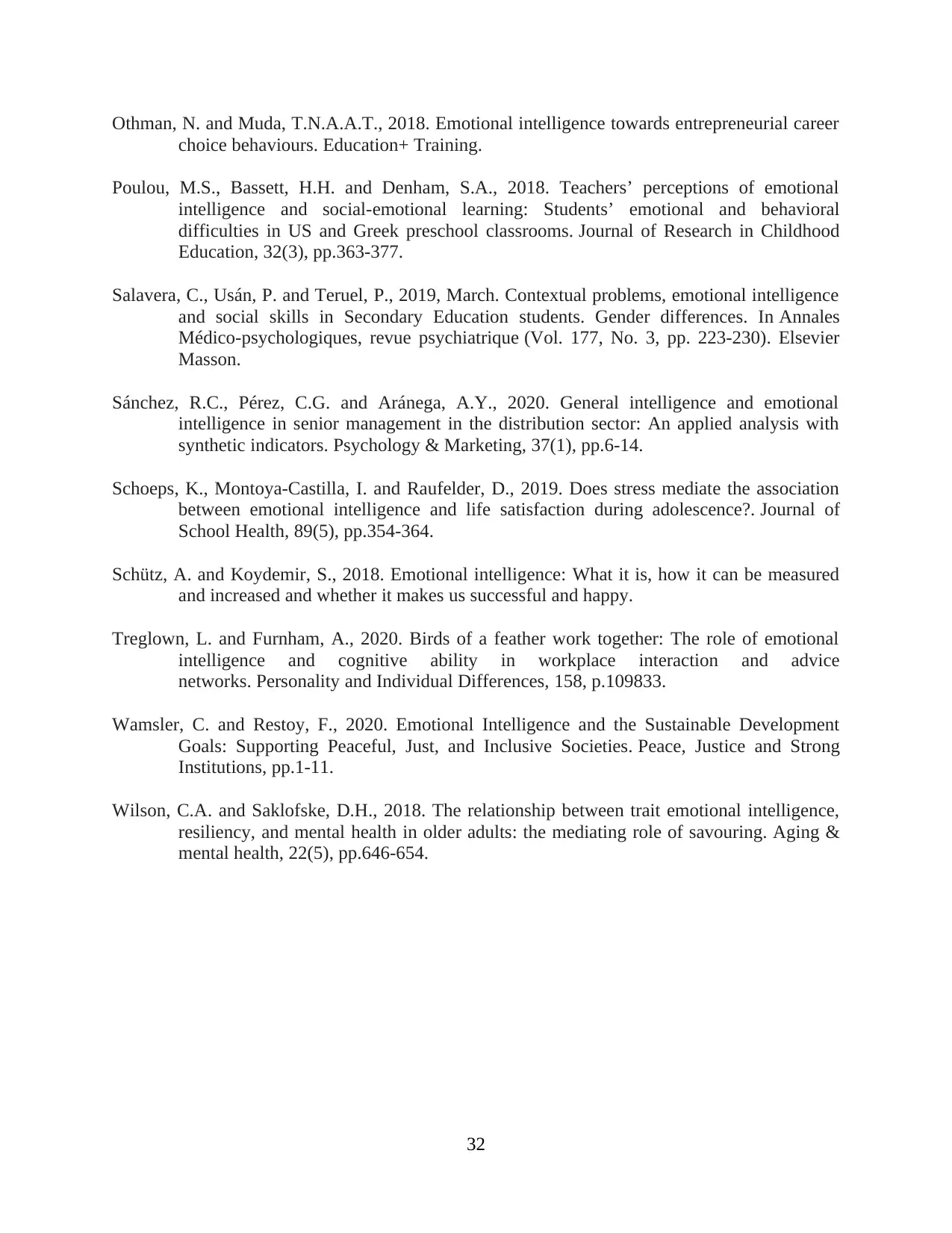
Othman, N. and Muda, T.N.A.A.T., 2018. Emotional intelligence towards entrepreneurial career
choice behaviours. Education+ Training.
Poulou, M.S., Bassett, H.H. and Denham, S.A., 2018. Teachers’ perceptions of emotional
intelligence and social-emotional learning: Students’ emotional and behavioral
difficulties in US and Greek preschool classrooms. Journal of Research in Childhood
Education, 32(3), pp.363-377.
Salavera, C., Usán, P. and Teruel, P., 2019, March. Contextual problems, emotional intelligence
and social skills in Secondary Education students. Gender differences. In Annales
Médico-psychologiques, revue psychiatrique (Vol. 177, No. 3, pp. 223-230). Elsevier
Masson.
Sánchez, R.C., Pérez, C.G. and Aránega, A.Y., 2020. General intelligence and emotional
intelligence in senior management in the distribution sector: An applied analysis with
synthetic indicators. Psychology & Marketing, 37(1), pp.6-14.
Schoeps, K., Montoya‐Castilla, I. and Raufelder, D., 2019. Does stress mediate the association
between emotional intelligence and life satisfaction during adolescence?. Journal of
School Health, 89(5), pp.354-364.
Schütz, A. and Koydemir, S., 2018. Emotional intelligence: What it is, how it can be measured
and increased and whether it makes us successful and happy.
Treglown, L. and Furnham, A., 2020. Birds of a feather work together: The role of emotional
intelligence and cognitive ability in workplace interaction and advice
networks. Personality and Individual Differences, 158, p.109833.
Wamsler, C. and Restoy, F., 2020. Emotional Intelligence and the Sustainable Development
Goals: Supporting Peaceful, Just, and Inclusive Societies. Peace, Justice and Strong
Institutions, pp.1-11.
Wilson, C.A. and Saklofske, D.H., 2018. The relationship between trait emotional intelligence,
resiliency, and mental health in older adults: the mediating role of savouring. Aging &
mental health, 22(5), pp.646-654.
32
choice behaviours. Education+ Training.
Poulou, M.S., Bassett, H.H. and Denham, S.A., 2018. Teachers’ perceptions of emotional
intelligence and social-emotional learning: Students’ emotional and behavioral
difficulties in US and Greek preschool classrooms. Journal of Research in Childhood
Education, 32(3), pp.363-377.
Salavera, C., Usán, P. and Teruel, P., 2019, March. Contextual problems, emotional intelligence
and social skills in Secondary Education students. Gender differences. In Annales
Médico-psychologiques, revue psychiatrique (Vol. 177, No. 3, pp. 223-230). Elsevier
Masson.
Sánchez, R.C., Pérez, C.G. and Aránega, A.Y., 2020. General intelligence and emotional
intelligence in senior management in the distribution sector: An applied analysis with
synthetic indicators. Psychology & Marketing, 37(1), pp.6-14.
Schoeps, K., Montoya‐Castilla, I. and Raufelder, D., 2019. Does stress mediate the association
between emotional intelligence and life satisfaction during adolescence?. Journal of
School Health, 89(5), pp.354-364.
Schütz, A. and Koydemir, S., 2018. Emotional intelligence: What it is, how it can be measured
and increased and whether it makes us successful and happy.
Treglown, L. and Furnham, A., 2020. Birds of a feather work together: The role of emotional
intelligence and cognitive ability in workplace interaction and advice
networks. Personality and Individual Differences, 158, p.109833.
Wamsler, C. and Restoy, F., 2020. Emotional Intelligence and the Sustainable Development
Goals: Supporting Peaceful, Just, and Inclusive Societies. Peace, Justice and Strong
Institutions, pp.1-11.
Wilson, C.A. and Saklofske, D.H., 2018. The relationship between trait emotional intelligence,
resiliency, and mental health in older adults: the mediating role of savouring. Aging &
mental health, 22(5), pp.646-654.
32
1 out of 32
Related Documents
Your All-in-One AI-Powered Toolkit for Academic Success.
+13062052269
info@desklib.com
Available 24*7 on WhatsApp / Email
![[object Object]](/_next/static/media/star-bottom.7253800d.svg)
Unlock your academic potential
© 2024 | Zucol Services PVT LTD | All rights reserved.





